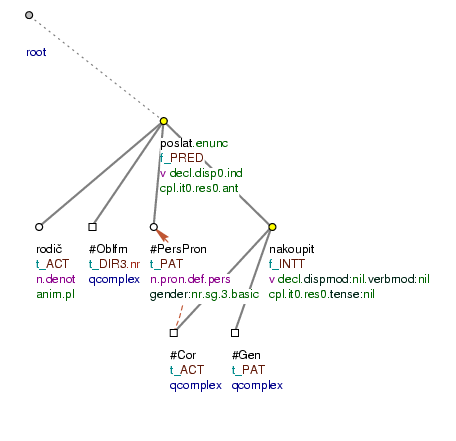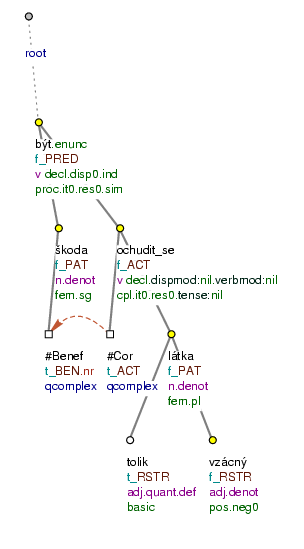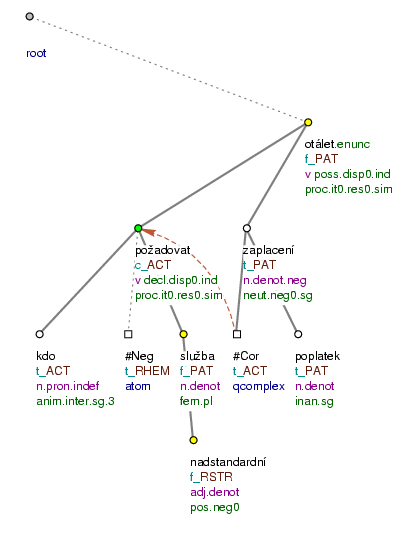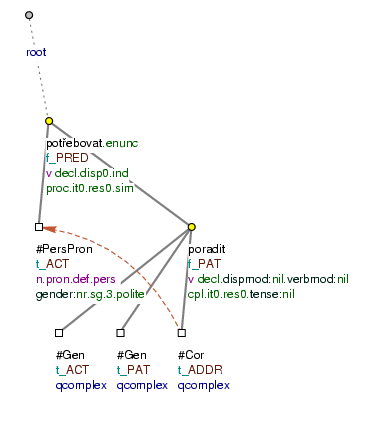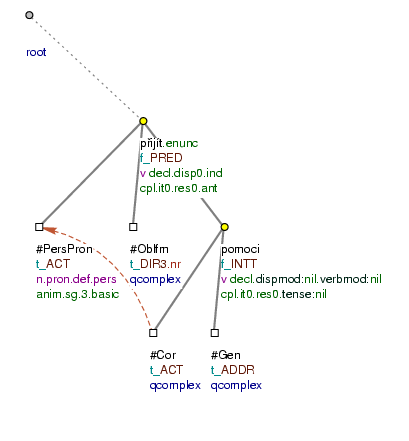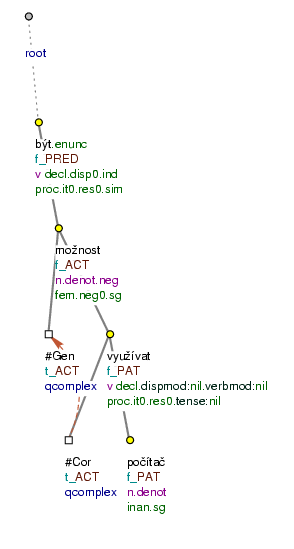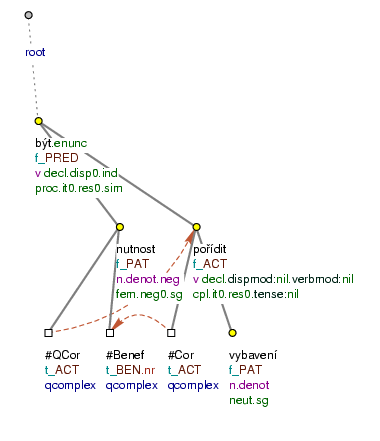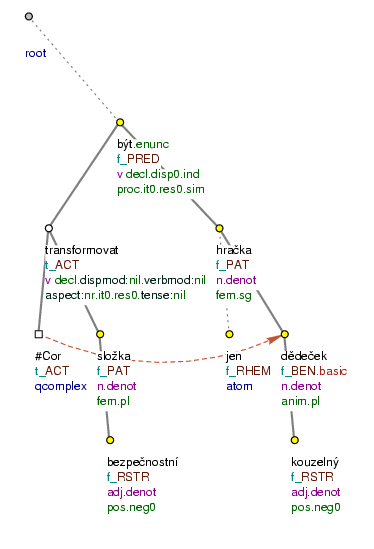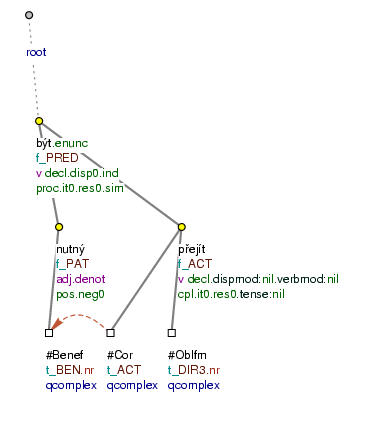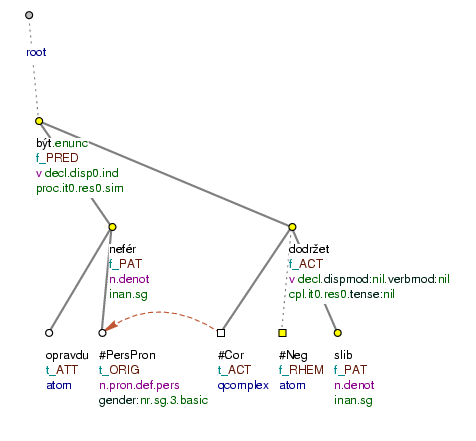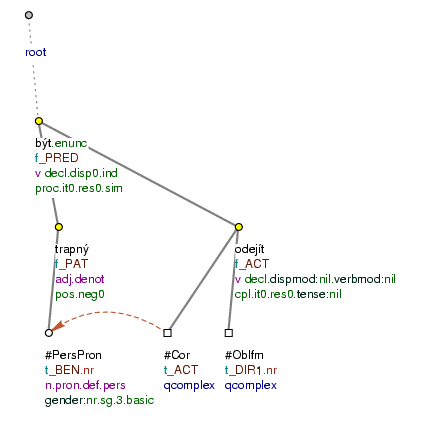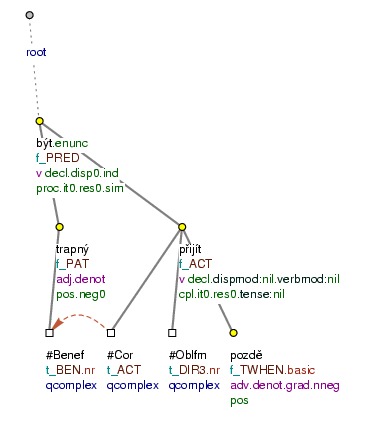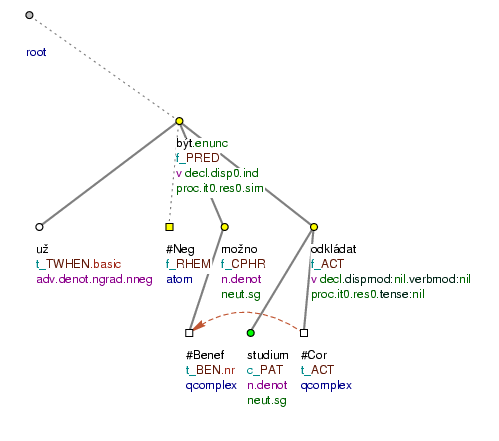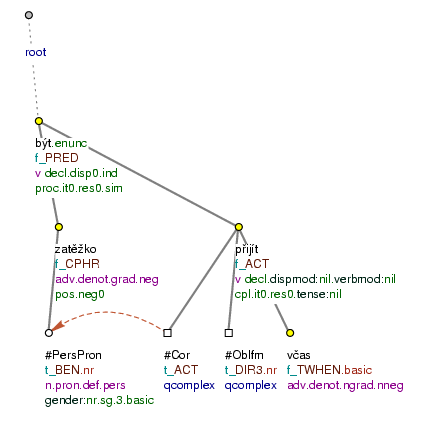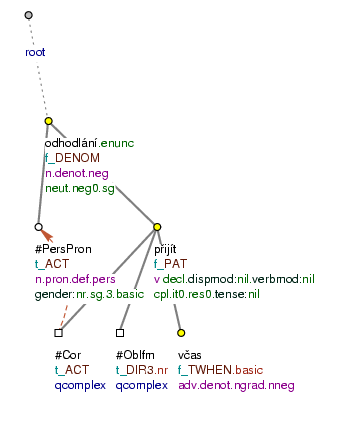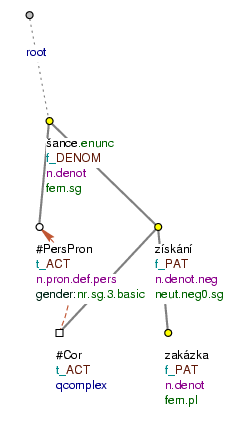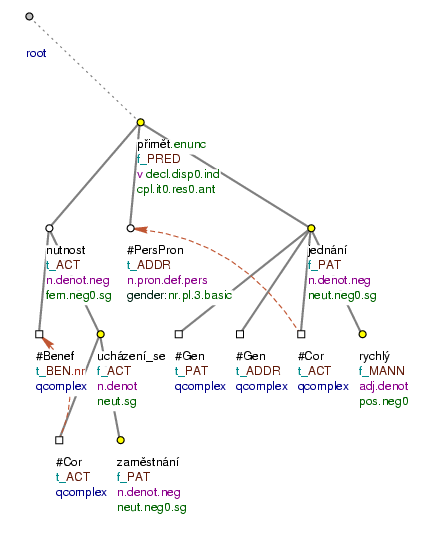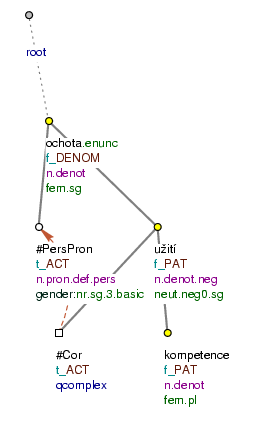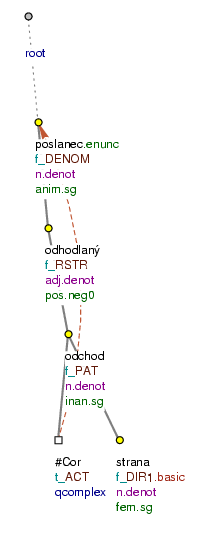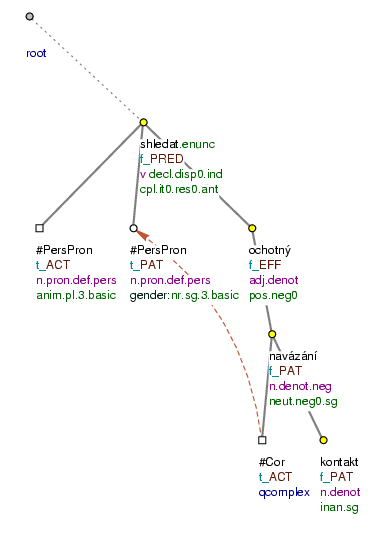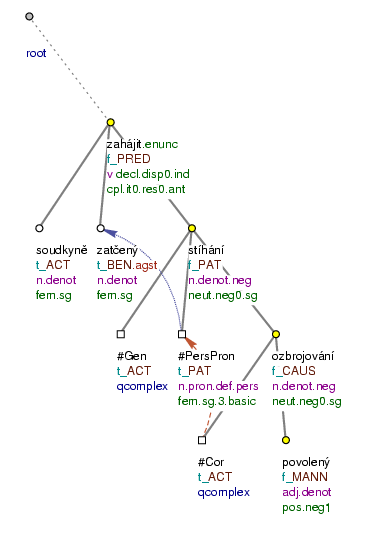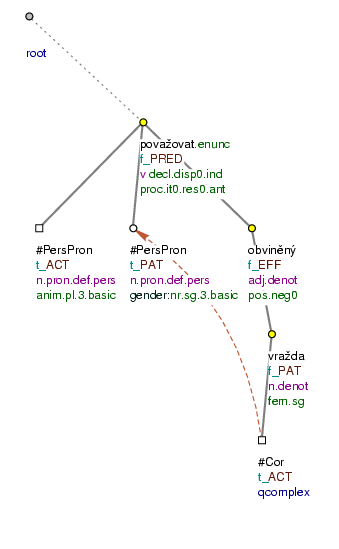Control is a type of grammatical coreference that arises with certain verbs, called control verbs. The coreference relation between the controller and controllee is either obligatory or optional and it holds that:
-
the controller is a member of the valency frame of the governing verb:
ACT,PAT,ADDR,ORIG, possibly also the obligatory adjunctLOC; in certain cases alsoBEN(see also Section 2.4.1.1, "Controller"). -
the controllee is a member of the valency frame of the infinitive (or deverbal noun) dependent on the control verb. It is usually the non-expressed subject of the infinitive (i.e. the Actor with active infinitives and Patient or Addressee with passive infinitives). The controllee's reference is obligatorily identical to that of the controller and it cannot be expressed at the surface (for more see Section 2.4.1.2, "The controllee").
-
the infinitive (one modification of which is the controllee) is a valency (or typical) modification of the control verb. Usually, it has an argument functor (most often
PAT), however, adjunct functors are sometimes also possible (see Section 2.4.1.3, "Infinitive a valency modification of which is controlled").
It is possible to find control also in constructions in which the control verb or the infinitive is nominalized - for more on this see Section 2.4.3, "Types of control constructions and the issue of nominalizations".
Representing control in the tectogrammatical trees. The controllee is assigned the t-lemma substitute #Cor. The grammatical coreference between the controller and controllee is marked in the following way: the coref_gram.rf attribute of the controllee contains the identifier of the controller. Cf.:
-
Pokud dámy postupují podobně, {
#PersPron.ACT} začnou brzy {#Cor.ACT} vyhlížet jako pánové. (=If ladies do the same they soon start to look like gentlemen)The Actor of the infinitive vyhlížet (=look like) is controlled by the Actor of the verb začít (=begin). Cf. Fig. 9.20.
The controller: the Actor of the control verb začít.
The controllee: the Actor (subject) of the infinitive vyhlížet.
-
Navíc mám Spartě co odvádět za to, že mi.
ADDRpřed lety umožnila {#Cor.ACT} dostat se do velkého fotbalu. (=...it helped me to get to professional football)The Actor of the infinitive dostat se (=get) is controlled by the Addressee of the verb umožnit (=enable). Cf. Fig. 9.21.
The controller: the Addressee of the control verb umožnit.
The controllee: the Actor (subject) of the infinitive dostat se.
Figure 9.20. Control
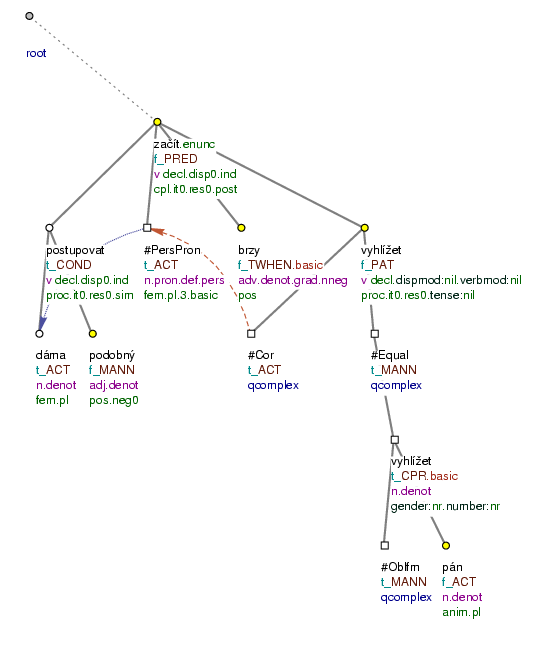
Pokud dámy postupují podobně, začnou brzy vyhlížet jako pánové. (=lit. If ladies proceed similarly, (they) start soon look like gentlemen)
Figure 9.21. Control
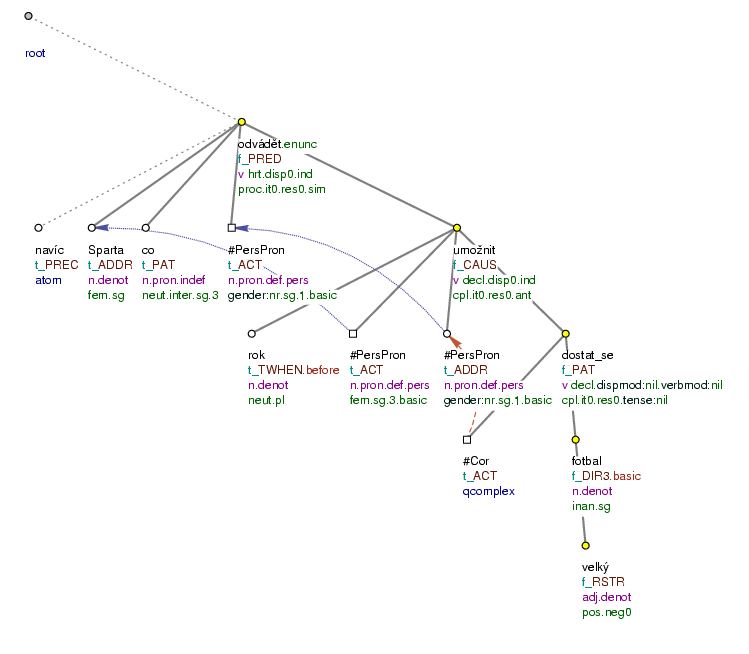
Navíc mám Spartě co odvádět za to, že mi před lety umožnila dostat se do velkého fotbalu. (=lit. Moreover (I) have to_Sparta what to_return for that, that me before years enabled to_get REFL to big football)
Control verbs. Control is given by the lexical properties (meaning) of the main verb. It is necessary to distinguish between individual meanings of the verb in question. Control is always connected to certain meanings of the verb (represented by different valency frames). Cf.:
-
Dala dítě spát. (=She put the child to sleep)
The valency frame for this meaning of dát:
ACT(.1)PAT(.4)EFF(.f)In this meaning, dát (=put) is a control verb. The Actor of the infinitive spát (=sleep) is controlled by the Patient of the verb dát.
-
Dala dítě léčit. (=She had the child treated/sent the child to the doctor)
The valency frame for this meaning of dát:
ACT(.1)PAT(.f)In this meaning, dát (=let) is not a control verb. No modification of the infinitive léčit (=cure) is controlled by any modification of the verb dát (the noun in the accusative belongs to the valency frame of the dependent infinitive.)
For the individual types of control verb see Section 2.4.2, "Types of control verbs".
!!! We assume that it is in principle possible to make a list of control verbs. So far, only several partial lists of control verbs have been made; these can be found in the appendix Appendix E, Verbs and nouns of control. As for the verbs listed in these lists, it can be guaranteed that control is always represented properly in the tectogrammatical trees. As for other control verbs, which are not listed, control is not represented consistently in the trees.
!!! Information concerning control properties of the verb is not included in the valency lexicon either.
Obligatory and optional control. There is obligatory and optional control:
-
obligatory control is a kind of control that is always present with a given meaning of a verb.
Obligatory control is involved e.g. in one of the meanings of the verb mínit (=mean), namely "zamýšlet (=intend)". Cf.:
-
the verb mínit is always a control verb:
Mínil přijít. (=He meant to come)
The Actor of the infinitive přijít is controlled by the Actor of the verb mínit.
-
the verb mínit cannot be used in a non-control context:
*Mínil, aby maminka přišla. (=*He meant for the mum to come)
-
-
optional control is a kind of control that does not have to be present with a given meaning of a verb.
Optional control is involved e.g. with the verb přát si (=wish) or the verbonominal predicate být výhodný (=be convenient). Cf.:
-
the verb přát si used in a control context:
Přál si odejít. (=He wished to leave)
The Actor of the infinitive odejít (=leave) is controlled by the Actor of the verb přát si.
-
the verb přát si used in a non-control context:
Přál si, aby přišla maminka. (=He wished for the mum to come)
-
the predicate být výhodný used in a control context:
Hněvat se na to, že vývoz surovin pokračuje, není pro nás výhodné. (=To be angry... is not convenient for us)
The Actor of the infinitive hněvat se (=to be angry) is controlled by the Beneficiary pro nás (=for us).
-
the predicate být výhodný used in a non-control context:
Není jasné, zda bude pro český tenis výhodnější smlouvu vypovědět či nikoli. (=...whether it is more convenient for the Czech tennis to terminate the contract)
The Actor of the infinitive vypovědět (=terminate) is not controlled by the Beneficiary pro český tenis (=for the Czech tennis).
-
Double control. In some cases, the verb can have so called double control, i.e. there are two possibilities to interpret a given structure (depending on the lexical content): either the controller is e.g. the Actor, or it is another valency modification of the control verb (usually the Adressee). Cf.:
-
Studenti slíbili učitelům přijít včas. (=The students promised their teachers to come in time)
The Actor of the infinitive přijít (=come) is controlled by the Actor of the verb slíbit (=promise).
-
Rodiče slíbili dětem strávit týden u moře. (=The parents promised the children to spend a week by the sea)
The Actor of the infinitive strávit (=spend) is controlled by the Addressee of the verb slíbit.
Two simultaneous coreference relations. Verbs allowing for two infinitive modifications are usually not control verbs (see Section 2.4.3.1, "Constructions with an infinitive that do not involve control"). In exceptional cases, however, such a verb can take part in two coreferential relations (control) at the same time (there is one controller but two controllees in the structure). An example is vyžadovat (=demand/require). Cf.:
-
Získat americké občanství vyžaduje od zájemců umět mluvit anglicky. (=To get the American citizenship, it is required from the applicants to be able to speak English)
The Origo of the verb vyžadovat (=demand) controls the Actor of the infinitive získat (=get), as well as the Actor of the infinitive umět (=be capable of)). Cf. Fig. 9.22.
Figure 9.22. Two simultaneous coreference (control) relations
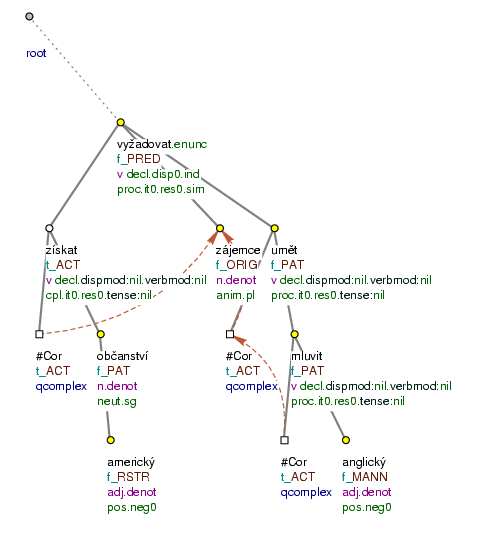
Získat americké občanství vyžaduje od zájemců umět mluvit anglicky. (=lit. To_get American citizenship requires from applicants to_be_able to_speak English)
The controller can be: ACT, PAT, ADDR or ORIG). Cf.:
-
Podnik.
ACTplánoval zvýšit výrobu. (=The company planned to increase the production)The Actor of the infinitive zvýšit (=increase) is controlled by the Actor of the verb plánovat (=plan). Cf. Fig. 9.23.
-
Rodiče ho.
PATposlali nakoupit. (=The parents sent him (go) shopping)The Actor of the infinitive nakoupit (=go shopping) is controlled by the Patient of the verb poslat (=send). Cf. Fig. 9.24.
-
Rodiče Jirkovi.
ADDRzakázali jít tam. (=The parents have forbidden Jirka to go there)The Actor of the infinitive jít (=go) is controlled by the Addressee of the verb zakázat (=forbid). Cf. Fig. 9.25.
In exceptional cases, the controller can also be an (obligatory) adjunct (LOC); cf.:
-
Být dobře zapsán u šéfa v něm.
LOCvyvolávalo pocit hrdosti (=To be in good relations with the boss made him proud).The Patient of the infinitive být zapsán (=lit. be recorded) is controlled by the locative adjunct. Cf. Fig. 9.26.
In some constructions in which the infinitive (one modification of which is controlled) depends on the verbal part of a verbonominal control predicate as its Actor (and in constructions derived from this one), the controller is the adjunct BEN; cf.:
-
Je škoda {
#Benef.BEN} ochudit se o tolik vzácných látek. (=It is a pity to be losing so many valuable substances)The Actor of the infinitive ochudit se (=to lose) is controlled by the modification with the
BENfunctor. Cf. Fig. 9.27.
An adjunct as a controller is a specific type of modification. The node for such a modification is always inserted in the tree if not present at the surface level. It is the only case when a non-obligatory adjunct is added to a tectogrammatical tree. Since it is always a Beneficiary, a special t-lemma substitute was introduced for such a controller: #Benef.
A Beneficiary is the controller in the constructions described in Section 2.4.4.4.2, ""Být" + noun the Actor of which can be expressed by an infinitival construction", Section 2.4.4.4.3, ""Být" + noun that cannot be modified by an infinitive", Section 2.4.4.4.4, ""Být" + modal or evaluating adjective (adverb)", Section 2.4.4.4.5, ""Být" + adjective or noun of "individual experience"", Section 2.4.4.4.6, ""Být" + predicative adverb" and Section 2.4.4.5, "Infinitive dependent on "lze" and control in constructions of the type "Je vidět Sněžku"" (and in the constructions derived from these).
The controller can also be represented by a whole clause (usually a subject clause). In these cases, there is a coreference relation between the controllee and the effective root node of the dependent clause. Cf.:
-
Kdo nepožaduje.
ACTnadstandardní služby, může se zaplacením poplatku otálet. (=Those who do not require more than standard service can be slow to pay)The Actor of the nominalized infinitive zaplatit (=pay) (the Actor of the noun zaplacení) is controlled by the Actor of the predicate moci otálet (=be slow), which is a dependent clause. Cf. Fig. 9.28.
Figure 9.23. ACT as the controller
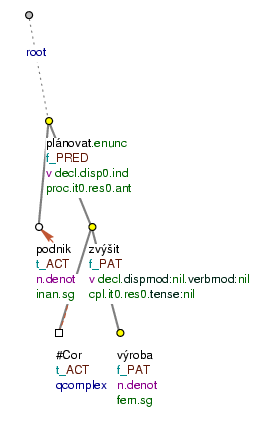
Podnik plánoval zvýšit výrobu. (=lit. Company planned to_increase production)
Figure 9.25. ADDR as the controller
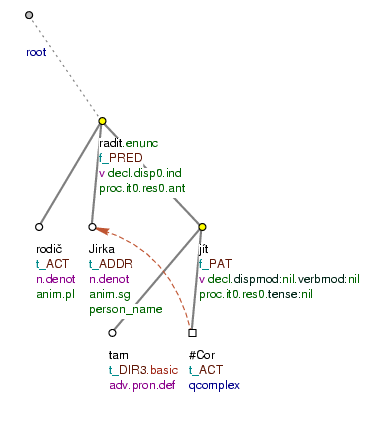
Rodiče Jirkovi radili jít tam. (=lit. Parents to_Jirka advised to_go there)
Figure 9.26. LOC as the controller
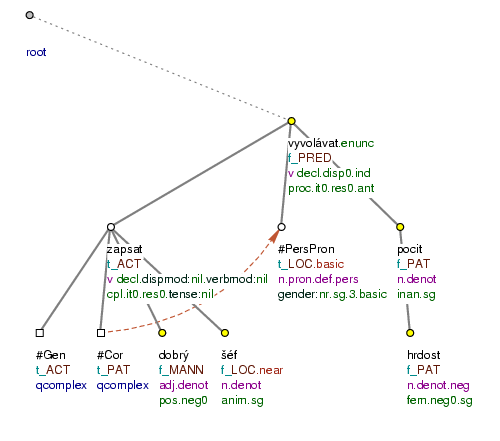
Být dobře zapsán u šéfa v něm vyvolávalo pocit hrdosti (=lit. To_be well registered with boss in him caused feeling (of) pride).
The controllee is always a valency modification of the infinitive (or deverbal noun) dependent on the control verb; most often, it is the Actor, however, it can also be the Patient or Addressee, too (esp. with passive infinitives). This valency modification corresponds to the subject of the infinitive. Cf.:
-
Honza se bál být spatřen {
#Cor.PAT}. (=Honza was afraid to be seen)The Actor of the predicate bát se (=be afraid) controls the Patient of the infinitive být spatřen (=be seen). Cf. Fig. 9.29.
-
Potřebujete poradit {
#Cor.ADDR}? (=Do you need advice (lit. to be advised)?)The Actor of the predicate potřebovat (=need) controls the Addressee of the infinitive poradit (=advise). Cf. Fig. 9.30.
Figure 9.29. PAT as the controllee

Honza se bál být spatřen. (=lit. Honza REFL was_afraid to_be seen)
Subject of the infinitive. The controllee is usuallly the non-expressed subject of the infinitive. The controllee has obligatorily the same reference as the controller and it is also obligatorily non-expressed. Therefore, not every infinitival subject is a controllee. Non-expressed subjects of infinitives can also have the t-lemma substitute #Gen or #PersPron. Moreover, subjects of infinitives can sometimes be expressed at the surface level. A survey of possible t-lemmas of expressed as well as non-expressed subjects of infinitives is in Table 9.4, "Subjects of infinitives: possible t-lemmas".
Table 9.4. Subjects of infinitives: possible t-lemmas
#Cor |
the subject cannot be expressed | the subject of the infinitive is in a control relation with a modification of the main verb |
#Gen |
the subject is not expressed | the subject of the infinitive is a general argument (see Section 2.4.1, "General arguments and unspecified Actors") |
#PersPron |
the subject is not expressed | it is possible to find the antecedent of the subject but it is not grammatical but rather textual coreference; see Section 3, "Textual coreference") |
the t-lemma of a noun/#PersPron |
the subject is expressed | the subject of the infinitive is expressed by a full noun or personal pronoun; these are the cases of infinitives expressing a condition (see Section 5.1.1.1, "Condition expressed by an infinitive") |
NB! The t-lemma substitute #Cor was introduced primarily for the controllee in control constructions. So far, it has been used also for non-expressed subjects of non-finite verb forms in constructions with dual dependency. Such constructions involve grammatical coreference but not control since the dependent non-finite verb form is neither a valency nor typical modification of the main verb (on grammatical coreference in these constructions see Section 2.3, "Coreference with verbal modifications that have dual dependency").
The infinitive a valency modification of which is controlled is usually a valency modification (the Actor, Patient, Effect) of the (governing) control verb. Cf.:
-
Nevyplácí se mu pracovat.
ACT(=It doesn't pay him to work)The infinitive pracovat (=work), the Actor of which is controlled by the Patient of nevyplácet se (=not pay), is in the position of its Actor. Cf. Fig. 9.31.
-
Vláda zamýšlí snížit.
PATdaně. (=The government intends to lower the taxes)The infinitive snížit (=lower), the Actor of which is controlled by the Actor of zamýšlet (=intend), is in the position of its Patient. Cf. Fig. 9.32.
Non-valency infinitives a modifications of which are controlled are especially infinitives with the INTT functor (for a discussion regarding the INTT functor w.r.t. valency, see Section 2.3.1.3.5, "Status of the modification expressing "intention" (INTT) after verbs of "motion""). Cf.:
-
Přišel pomoci.
INTT(=He came to help)The infinitive pomoci (=help), the Actor of which is controlled by the Actor of přijít (=come), is in the position with the
INTTfunctor. Cf. Fig. 9.33.
Another example:
Byli jsme to obhlédnout.INTT (=We went to look around the place) Fig. 9.34
NB! Cases of so called Slavic accusative + infinitive (Slyšel Karla otvírat.EFF dveře. (=He heard Karel open the door)) are not regular cases of control. See Section 2.3, "Coreference with verbal modifications that have dual dependency".
Figure 9.31. Control: infinitive as the Actor

Nevyplácí se mu pracovat. (=lit. Not_pays REFL him to_work)
Figure 9.32. Control: infinitive as the Patient
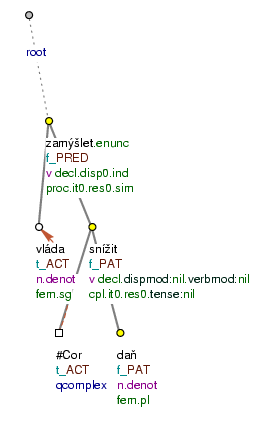
Vláda zamýšlí snížit daně. (=lit. Government intends to_lower taxes)
Figure 9.34. Control: infinitive as INTT
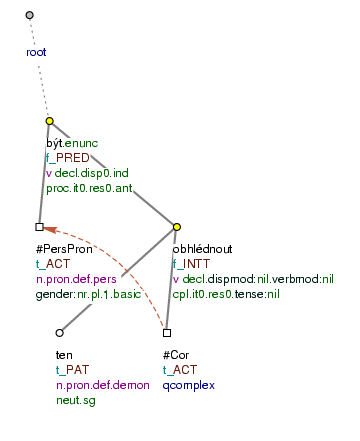
Byli jsme to obhlédnout. (=lit. (We) were AUX it look_around)
NB! Also some verbs are considered control verbs which do not have infinitives as their modifications, but which are rather modified by a prepositional phrase with a deverbal noun one modification of which is controlled; e.g.: stíhat (=prosecute), podezírat (=suspect), obvinit (=blame), omluvit se (=apologize) (see Section 2.4.6.2, "Control verbs that cannot be modified by an infinitive"). The deverbal noun (a modification of which is controlled) can also occupy the position of a non-valency (just typical) modification. Cf.:
-
Stíhají ho.
PATpro falšování.CAUSdokladů. (=They are prosecuting him for falsifying the documents)The Actor of the noun falšování (=falsifying) (which is in the position of
CAUS) is controlled by the Patient of the verb stíhat (=prosecute).
Both one-word and multi-word predicates can be control predicates (see Section 9, "Multi-word predicates"). As for multi-word predicates, there are some complex predicates that belong to control predicates (see Section 9.3, "Complex predicates"), as well as some verbonominal predicates (see Section 2.1.3, "Copula "být" (verbonominal predicate)") and verbal idioms (phrasemes) (see Section 8.2, "Verbal idioms").
From the semantic point of view, also the following semantically homogeneous groups of verbs are - among others - regarded as control verbs:
-
modal verbs.
Combinations of modal verbs and infinitives are analyzed according to the rules on representing modality (see Section 9.1.1, "Modal predicates"). In cases in which the modal verb is not hidden (e.g. in combinations of a modal verb with a negated verb in infinitive) the construction is treated as a construction involving control. The controllee is usually the Actor or Patient in the position of the non-expressed subject of the infinitive. The controller is the Actor of the modal verb. Cf.:
-
Může nepřijít. (=lit. (She) can not_come)
The subject of the infinitive nepřijít (=not come) (the Actor) is controlled by the Actor of the verb moci (=can).
-
-
phase verbs.
Phase verbs (see Section 9.1.2, "Phase predicates") are control verbs in those cases in which their meaning corresponds to the valency frame with an infinitive in the Patient position. The controllee is usually the Actor or Patient in the position of the non-expressed subject of the infinitive. The controller is the Actor of the phase verb. Cf.:
-
Začal číst.
PAT(=He started to read)The subject of the infinitive číst (=read) (the Actor) is controlled by the Actor of the verb začít (=begin).
Phase verbs can also have an infinitive as their Actor; then, no control is involved. Srov.:
-
Začíná pršet.
ACT(=It's beginning to rain)The infinitive pršet (=rain) has no subject. The verb začínat (=begin) is used but no control is involved.
-
Leckomu se začíná o tom zdát.
ACT(=Many people begin to dream about it)The Actor of the infinitive zdát se (=dream) is expressed by the dative leckomu (=to many people). The verb začínat (=begin) is used without control being involved.
There can also be more phase verbs in a single sentence; then it is necessary to determine which of their uses is involved in each case; e.g. in Měl by konečně začít přestat kouřit. (=He should begin to stop smoking) both phase verbs, začít (=begin) as well as přestat (=stop) are used in their control use. On the other hand, in člověk, jehož právě začala přestávat bolet hlava (=the person whose headache has just started to cease) both phase verbs are used in their non-control use.
-
-
verbs of "intention" and "responsibility acceptance".
Verbs of "intention" are considered control verbs although construction with these verbs can sometimes be interpreted such that the person who has the intention to do something does not have to perform the given activity himself/herself. However, the person is responsible for the action. The potential non-identity of the agents is neglected as carrying out the action is the responsibility of the person who has the intention to do it. Cf.:
-
Vedení sekce plánuje vyklidit knihovnu. (=The management of the section plans to clear out the library)
The Actor of the infinitive vyklidit (=clear out) is analyzed as the controllee of the Actor of the verb plánovat (=plan), although the person who has the intention to clear out the library does not have to be the one who is actually going to do it.
-
Pan Moric si vytkl za cíl proniknout na neobsazené trhy přijatelné pro Radu bezpečnosti. (=Mr. Moric set as his goal to get to the markets...)
From the context, we know that it is going to be arms factories that will be getting to the markets, and still the Actor of the infinitive proniknout (=penetrate) is analyzed as controlled by the Actor of the verb vytknout si (=set).
The annotation of certain metonymical uses of some other verbs of "responsibility acceptance" is similar to that of the verbs of "intention"; the identity of the agents of the governing verb and the dependent infinitive does not have to be uncontroversial, nevertheless, such constructions are analyzed as control constructions. Cf.:
-
Slíbil zapůjčit promítačku. (=He promised to lend us the projector)
The Actor of the infinitive zapůjčit (=lend) is analyzed as controlled by the Actor of the verb slíbit (=promise), though the construction can also be interpreted as Slíbil zajistit, že někdo jiný zapůjčí promítačku (=He promised to arrange that somebody else lend us the projector).
-
Multi-word control predicates. Multi-word predicates constitute a special group of control predicates. All (synonymous) multi-word paraphrases of control verbs are considered complex control predicates. These are especially:
-
quasi-modal and quasi-phase verbs.
For more on quasi-modal and quasi-phase verbs, see Section 9.2.1, "Quasi-modal and quasi-phase verbs".
-
verbs with the meaning "enabling somebody to do something "
Verbs with the meaning "enabling sb to do sth" are control verbs both in their active (i.e. "sb enabled sb else to do sth"), and passive meaning (i.e. "sb was allowed/enabled to do sth"); e.g. dát někomu šanci udělat něco (=to give sb the chance to do sth), but also dostat (od někoho) šanci udělat něco (=to get the chance to do sth (from sb)), similarly dát někomu příležitost udělat něco (=to provide sb the opportunity to do sth) and dostat (od někoho) příležitost udělat něco (=to get/have the opportunity to do sth (from sb)).
-
verbal idioms (phrasemes).
For example: mít v plánu (=to plan), mít v úmyslu (=intend). For more on verbal idioms, see Section 8.2, "Verbal idioms".
Control nouns and adjectives. There are also control nouns and adjectives - the result of nominalization of control predicates. Cf.:
-
Odhodlal se podat trestní oznámení. (=He decided to lodge a complaint)
The Actor of the infinitive podat (=lodge) is controlled by the Actor of the verb odhodlat se (=decide).
-
jeho odhodlání podat trestní oznámení (=his decision to lodge a complaint)
The Actor of the infinitive podat is controlled by the Actor of the noun odhodlání (=decision).
-
člověk odhodlaný podat trestní oznámení (=the person determined to lodge a complaint)
The Actor of the infinitive podat is controlled by the governing noun of the adjective odhodlaný (=decided) (see also Section 2.3.3, "Valency of adjectives").
Typical control nouns are nouns that are part of complex control predicates; e.g.: odvaha (=courage), chuť (=apprx. desire), šance (=chance), příležitost (=opportunity), povinnost (=obligation) etc. A specific group of control nouns are nouns of "intention", e.g.: úmysl (=intention), záměr (=aim), plán (=plan) etc. Nouns of the type nápad (=idea), idea, myšlenka (=thought) etc. are not considered nouns of "intention". There is no control relation involved in constructions with these nouns. Cf.:
-
Petrův nápad založit nadaci se Pavlovi líbí. (=Pavel likes Peter's idea to found a foundation)
The Actor of the infinitive založit (=found) is assigned the
#Gent-lemma - if it is the case of the general (unspecified) Actor - or it gets the#PersPront-lemma - if it is obvious from the context which person (e.g. Petr) is going to found the foundation.
In most cases of control constructions, it is possible to nominalize the governing verb, as well as the infinitive. Therefore, the following types of control constructions can be distinguished:
-
an infinitive (a modification of which is controlled) depends on a verbal control predicate (see Section 2.4.4, "Type 1: Infinitive dependent on a verbal control predicate"),
-
an infinitive depends on the nominalized control predicate, i.e. on a deverbal noun or adjective (see Section 2.4.5, "Type 2: Infinitive dependent on a nominalized control predicate"),
-
a deverbal noun (a modification of which is controlled) depends on a verbal control predicate (see Section 2.4.6, "Type 3: Noun dependent on a verbal control predicate"),
-
a deverbal noun depends on a nominalized control predicate (see Section 2.4.7, "Type 4: Noun dependent on a nominalized control predicate"),
Most control verbs can be found in all the four types of construction. Cf.:
-
Slíbil napsat dopis. (=He promised to write a letter)
An infinitive depending on a verbal control predicate (type 1).
-
slib napsat dopis (=the promise to write a letter)
An infinitive depending on a nominalized verbal control predicate, i.e. on a deverbal noun (type 2 ).
-
Slíbil napsání dopisu. (=lit. (He) promised writing letter)
A deverbal noun, i.e. a nominalized infinitive depending on a verbal control predicate (type 3).
-
slib napsání dopisu (=lit. promise (of) writing letter)
A deverbal noun, i.e. a nominalized infinitive, depending on a nominalized control predicate (type 4).
Some control verbs (e.g.: přisoudit (=ascribe/attribute), osočit (=smear/malign), podezírat (=suspect), stíhat (=prosecute), omluvit se (=apologise)) cannot be modified by an infinitive at all (see Section 2.4.6.2, "Control verbs that cannot be modified by an infinitive"). Hence, they only occur in constructions of type 3 and 4; e.g.:
Podezíral ho z krádeže. (=He suspected him of theft) (It is not possible to say: *Podezíral ho krást. (=lit. (He) suspected him to_steal))
podezření z krádeže (=suspicion of theft) (Not: *podezření krást (=lit. suspicion to_steal))
In exceptional cases, no nominalization of the infinitive (a modification of which is controlled) is possible and no nominalization of the governing verb either. Such control verbs can, then, only occur as type 1, e.g:
Viktor se zdá být chytrý. (=Viktor seems to be clever)
Nominalization-related problems. Nouns are significantly vaguer than verbs (an infinitive); thus the decision whether a given combination of a verb with a noun (or a noun with a noun) is really a control construction is accompanied by several problems:
-
it is not necessarily clear whether the given combination verb + noun has been derived from a combination verb + infinitive or rather verb + subordinate clause. Compare the two meanings of:
-
Mikolášek se vyhýbá jednoduchému ztvárnění svých nápadů. (=Mikolášek avoids simple representation of his ideas)
= Mikolášek does not want to represent his ideas simply.
In this interpretation, the sentence Mikolášek se vyhýbá jednoduchému ztvárnění svých nápadů involves a control relation between the Actor of the nominalized infinitive ztvárnit (=represent) and the Actor of the verb vyhýbat (=avoid).
-
Mikolášek se vyhýbá jednoduchému ztvárnění svých nápadů.
= Mikolášek does not want anybody/somebody to represent his ideas simply.
In this interpretation, no control relation is present.
-
-
a noun may not express the reflexivity of its base verb. Cf. the two meanings of:
-
jeho rozhodnutí zrušit výrobu (=his decision to stop the production)
= he decided to stop the production
In this interpretation, jeho rozhodnutí zrušit výrobu (=to stop the production) involves a control relation between the Actor of the infinitive zrušit (=stop) and the Actor of the nominalized verb rozhodnout se (=decide). The verb rozhodnout se is a control verb.
-
jeho rozhodnutí zrušit výrobu
= he decided that someone else should stop the production
In this interpretation, there is no control relation in present. The verb rozhodnout is not a control verb.
In cases when it is hard or impossible to decide which of the cases we are dealing with, we assume that the noun is derived from the non-reflexive verb.
-
Sections Section 2.4.4, "Type 1: Infinitive dependent on a verbal control predicate", Section 2.4.5, "Type 2: Infinitive dependent on a nominalized control predicate", Section 2.4.6, "Type 3: Noun dependent on a verbal control predicate" and Section 2.4.7, "Type 4: Noun dependent on a nominalized control predicate" discuss individual types of control constructions in more detail; especially more problematic cases with complex control predicates (subcategory of type 1) and types 2 through 4 are described there.
Not every construction with an infinitive is necessarily a control construction. There is no control involved in the following cases:
Rozhodl zrušit výrobu. (=He decided to stop the production; meaning: that someone else should stop the production)
Zakotvit do ústavy trvale vyrovnaný rozpočet nepovažuje za nejšťastnější místopředseda sněmovny Jiří Vlach. (=JV doesn't find it wise to lay down the requirement for a permanently balanced budget in the constitution)
Proto považujeme za klíčovou otázku tento systém změnit. (=Therefore, we consider it necessary to change the system)
Dala dítě léčit. (=lit. (She) had (the) child treat)
This also concerns:
-
constructions with verbs having two infinitival modifications. These are especially být (=be) and znamenat (=mean).
Examples:
Napsat článek pro mě znamená měsíc nedělat nic jiného. (=To write an article means not to do anything else for a month)
Ustupovat jim znamená vracet se ke státem řízené ekonomice. (=To give in means to come back to the state-governed economics)
Dělat to takto by bylo nošením dříví do lesa. (=To do it this way would be carrying coals to Newcastle)
Nemoci důvěřovat je jako pobývat u nepřítele. (=Not to be able to trust is like to be with an enemy)
Nechat se ošidit je jako dostat facku. (=To be cheated is like getting (to get) a slap in the face)
For more on the verb vyžadovat (=demand), see Section 2.4.1, "The notion of control".
-
constructions in which the infinitive occurs in place of a finite verb form (see Section 4.1, "Verbal clauses").
Examples:
Ale proč o tom uvažovat. (=Why should we think about it; lit. why to think about it)
Pro mě z toho vyplývá jediné: Nikdy nesvolit. (=lit. Never to agree)
-
constructions in which the infinitive occupies the position of the Actor of "být" in its existential or substitute use (not the type "Je vidět Sněžku (=It is possible to see Sněžka)" - see Section 2.1.1, "Existential "být"" and Section 2.1.2, "Substitute "být"").
Examples:
Je co číst. (=There is something to read)
Teď je pozdě litovat. (=Now it's late to be sorry)
The newly established node for the non-expressed subject of the infinitive (or its nominalization) has the #Gen or #PersPron t-lemma, depending on the type of ellipsis and the relevant coreference relation (see also Section 12.2, "Ellipsis of the dependent element").
This is the basic type of control constructions.
Within this type, there are more complex structures - the infinitive is dependent on a multi-word control predicate: a complex control predicate, a verbal idiom or a verbonominal control predicate. This mainly concerns quasi-modal and quasi-phase verbs (see Section 9.2.1, "Quasi-modal and quasi-phase verbs"), which form a special subtype of complex and verbonominal predicates. (For more on multi-word predicates, see Section 9, "Multi-word predicates".)
The following subsections describe these types of more complex control constructions:
-
an infinitive depends on the nominal part of a complex control predicate (see Section 2.4.4.1, "Infinitive dependent on the nominal part of a complex control predicate"),
-
an infinitive depends on a verbal idiom, which is a control predicate (see Section 2.4.4.2, "Infinitive dependent on a verbal idiom (which is a control predicate)"),
-
an infinitive depends on the nominal part of a verbonominal control predicate (see Section 2.4.4.3, "Infinitive dependent on the nominal part of a verbonominal control predicate"),
-
an infinitive depends on the verbal part of a verbonominal control predicate (see Section 2.4.4.4, "Infinitive dependent on the verbal part of a verbonominal control predicate"),
-
an infinitive depends on the predicate "lze"; control in the constructions of the type "Je vidět Sněžku" (see Section 2.4.4.5, "Infinitive dependent on "lze" and control in constructions of the type "Je vidět Sněžku"").
!!! There was a subsequent check on the representation of type 1 constructions with one-word verbal predicates (i.e. verb + infinitive) and a list of control verbs was created (see Section 1, "Verbs of control"). As for the verbs in this list, it can be guaranteed that control is marked in the tectogrammatical trees as well. As for other control verbs, which are not listed, control is not marked consistently in the trees.
The nominal parts of complex predicates (esp. with quasi-modal and quasi-phase verbs; see Section 9.2.1, "Quasi-modal and quasi-phase verbs") are often nouns one modification of which can have the form of an infinitive. One of the infinitive's modifications (usually the one in the subject position) is often controlled by the Actor of the verbal part of the complex predicate.
The Actor of the verbal part of a complex predicate is also usually identical in reference with the Actor of the nominal part of the complex predicate. This is so called quasi-control; see Section 9.3.4.2, "Sharing of valency modifications between the verbal and nominal components (quasi-control)".
Cf.:
-
(My.
ACT) máme záměr.CPHR{#Cor.ACT} vyklidit prostory. (=We have the intention to clear out the premises)The Actor of the infinitive vyklidit (=clear out) (dependent on the nominal part of the predicate mít záměr (=have the intention)) is controlled by the Actor of the verbal part of the complex control predicate (my), which is identical in reference with the non-expressed Actor of the noun záměr (=intention). Cf. Fig. 9.35.
More examples:
Petr dostal od šéfa rozkaz.CPHR {#Cor.ACT} přijít. (=Petr got the order from his boss to come) Fig. 9.36
Šéf dal Petrovi rozkaz.CPHR {#Cor.ACT} přijít. (=The boss gave Petr the order to come) Fig. 9.37
Nyní se (nám.ACT ) naskýtá možnost.CPHR {#Cor.ACT} slyšet operu. (=Now we have the possibility to hear an opera) Fig. 9.38
Figure 9.35. Complex control predicates
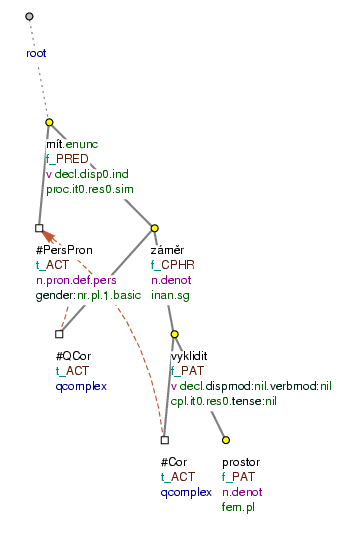
Máme záměr vyklidit prostory. (=lit. (We) have intention to_clear_out premises)
Figure 9.36. Complex control predicates
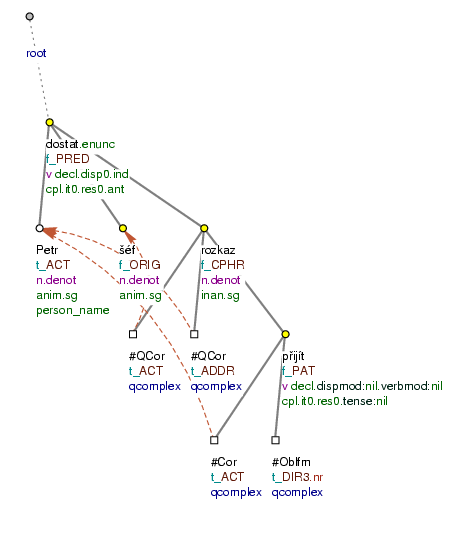
Petr dostal od šéfa rozkaz přijít. (=lit. Petr got from boss order to_come)
Figure 9.37. Complex control predicates
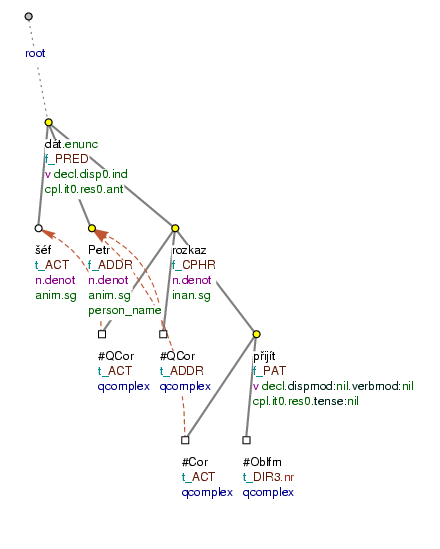
Šéf dal Petrovi rozkaz přijít. (=lit. Boss gave Petr order to_come)
Figure 9.38. Complex control predicates
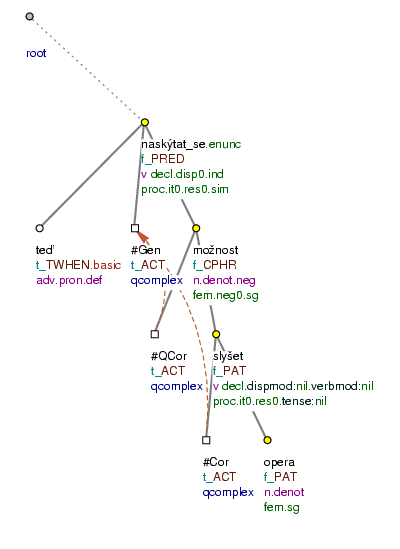
Nyní se naskýtá možnost slyšet operu. (=lit. Now REFL comes possibility to_hear opera)
NB! Also with complex control predicates it is necessary to distinguish different meanings of the given predicate. E.g. mít zájem (=lit. have interest) has at least two meaning, which can be expressed by the following two verbs: chtít (=want) and zajímat se (=be interested in). Only in the first meaning, the predicate is a control predicate. Cf.:
-
Měl zájem (= chtěl) studovat vysokou školu. (=He wanted to study at a university)
Měl zájem o studium na vysoké škole. (=He was interested in studying at a university)
The subject of the infinitive studovat (=study) (or its nominalization) is controlled by the Actor of the verb mít (=have).
-
Měl zájem (= zajímal se) o synovo studium. (=He was interested/took interest in his son's studies)
No control is involved in this construction.
Then, there is also mít zájem na něčem (=take interest in sth/have a stake in sth), which is not a control predicate either.
!!! There was a subsequent check on the representation of type 1 constructions with complex predicates (i.e. complex predicate + infinitive) and a list of complex control predicates was created (see Section 1, "Verbs of control"). As for the verbs in this list, it can be guaranteed that control is marked in the tectogrammatical trees as well. As for other control verbs, which are not listed, control is not marked consistently in the trees.
Some verbal idioms (see Section 8.2, "Verbal idioms") are also control predicates.
For verbal idioms, it can be said that in principle no argument ever depends on the dependent part of the idiom. The infinitive, which could - in theory - be said to depend on the dependent part of the idiom, is therefore always represented as dependent on the verbal part of the idiom. One of the infinitive's modifications (usually the one in the subject position) is controlled, usually by the Actor of the verbal part (or more precisely, the Actor of the whole idiom). Srov.:
-
Petr má v plánu.
DPHR{#Cor.ACT} vystudovat fakultu. (=Petr plans (lit. has in plan) to finish his studies at the faculty)The Actor of the infinitive vystudovat (=finish studies) (dependent on the verbal part of the idiom, i.e. on mít) is controlled by the Actor of the verbal part of the idiom, the noun Petr. Cf. Fig. 9.39.
Another example:
(Já) nejsem s to.DPHR to{#Cor.ACT} zvládnout. (=I am not able to handle it) Fig. 9.40
Figure 9.39. Verbal idioms as control predicates
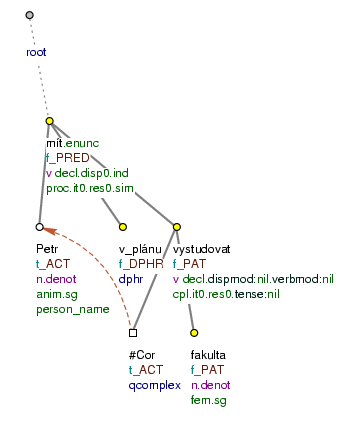
Petr má v plánu vystudovat fakultu. (=lit. Petr has in plan to_study faculty)
Figure 9.40. Verbal idioms as control predicates
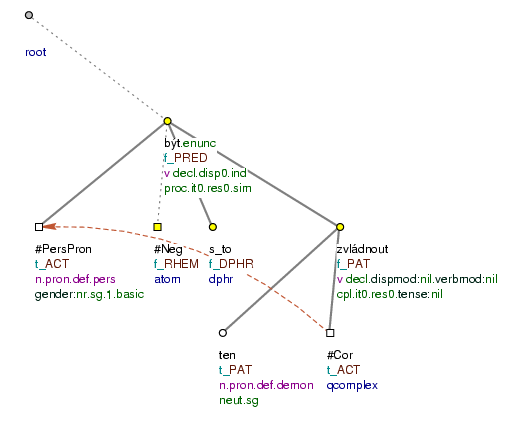
Nejsem s to to zvládnout. (=lit. (I) not_am with it it handle)
!!! Control with verbal idioms is not represented consistently in the data; often, it is not represented at all.
Verbonominal predicates with certain adjectives (e.g.: schopný (=able), ochotný (=willing), povinen (=obliged), povinován, náchylný (=inclined), připravený (=ready), způsobilý (=qualified)), especially quasi-modal predicates (see Section 9.2.1, "Quasi-modal and quasi-phase verbs"), are multi-word control predicates with which the infinitive is the Patient of the non-verbal (here:adjectival) part of the predicate.
In order for the combination být + adjective to belong to this type, it is essential that the adjective have the possibility to be modified by an infinitive (the infinitive is the Patient of the adjective).
The controlled modification of the infinitive (usually the subject) is controlled by the Actor of the copula být, which is identical in reference with the Actor of the adjective. However, in accordance with the rules for representing valency modifications of deverbal adjectives (see Section 2.3.3, "Valency of adjectives"), there is no node for the Actor dependent on the adjective. Cf.:
-
Pavel je ochoten {
#Cor.ACT} přijít. (=Pavel is willing to come)The Actor of the infinitive přijít (=come) (dependent on ochoten (=willing)) is controlled by the Actor of the verbal part of the predicate, namely by the noun Pavel. Cf. Fig. 9.41.
More examples:
(On) už je rozhodnutý nás {#Cor.ACT} opustit. (=He has decided (lit. is decided) to leave us) Fig. 9.42
Pavel to není schopný {#Cor.ACT} zařídit. (=Pavel is not able to arrange it)
(My) jsme připraveni vám všechno {#Cor.ACT} ukázat. (=We are ready to show you everything)
Figure 9.41. Verbonominal control predicates
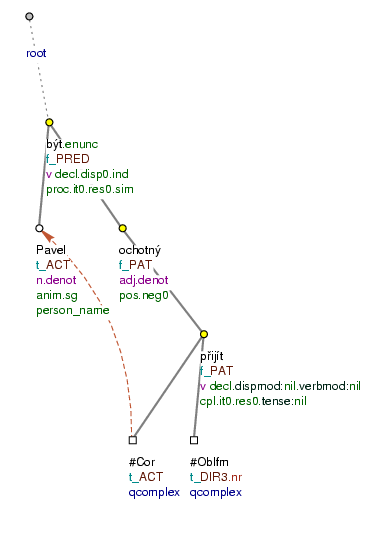
Pavel je ochoten přijít. (=lit. Pavel is willing to_come)
Figure 9.42. Verbonominal control predicates
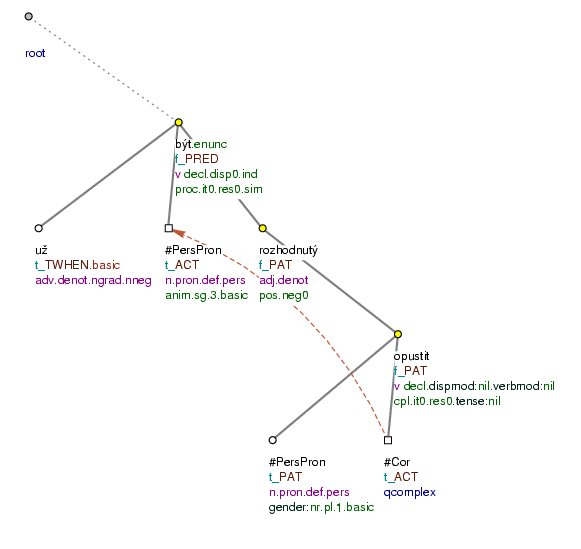
Už je rozhodnutý nás opustit. (=lit. Already (he) is decided us to_leave)
!!! Control with predicates with the copula být is not represented consistently in the data.
The infinitive that depends on the verbal part of a verbonominal predicate is the Actor of the predicate. In such cases, control is often optional. What is special about these constructions is that the controlled modification of the infinitive is often controlled - apart from the usual arguments - by the modification with the BEN functor, which is dependent on the non-verbal part of the verbonominal predicate.
The following types of verbonominal predicates belong to this category:
-
the copula být + noun:
-
a modal/evaluating noun of "intention" and "responsibility acceptance":
-
the Patient of which can be expressed by an infinitive (see Section 2.4.4.4.1, ""Být" + noun the Patient of which can be expressed by an infinitival construction").
For example: je povinnost(í) (=lit. is duty); je úkol(em) (=lit. is task); je cíl(em) (=lit. is goal); je problém(em) (=lit. is problem); je přání(m) (=lit. is wish); je důvod(em) (=lit. is reason); je možnost(í) (=lit. is possibility).
-
the Actor of which can be expressed by an infinitival construction (see Section 2.4.4.4.2, ""Být" + noun the Actor of which can be expressed by an infinitival construction").
For example: je nutnost(í) (=lit. is necessity).
-
which cannot be modified by an infinitive (see Section 2.4.4.4.3, ""Být" + noun that cannot be modified by an infinitive").
For example: je hračka (=lit. is piece_of_cake).
-
-
a noun of "individual experience" (see Section 2.4.4.4.5, ""Být" + adjective or noun of "individual experience"").
For example: je mi radostí (=lit. is to_me pleasure); je mi potěšením (=lit. is to_me pleasure).
-
-
the copula být + adjective (or adverb):
-
a modal/evaluating adjective (or adverb; see Section 2.4.4.4.4, ""Být" + modal or evaluating adjective (adverb)").
For example: je možné (=is possible); je nutné (=is necessary), je jednoduché (=is easy); je nepostradatelné (=is indispensable).
-
an adjective of "individual experience" (see Section 2.4.4.4.5, ""Být" + adjective or noun of "individual experience"").
Například: je mi trapné (=lit. is to_me embarrassing).
-
These verbonominal predicates the non-verbal part of which is assigned the PAT functor, are related to the types with (predicative) adverbs, which are assigned the CPHR functor (see Section 2.1.3, "Copula "být" (verbonominal predicate)"):
-
být + predicative adverb (see Section 2.4.4.4.6, ""Být" + predicative adverb").
For example: je nutno (=is necessary.adv); je možno (=is possible.adv); je třeba (=is necessary.adv); je mi zatěžko (=lit. is to_me hard.adv), je škoda (=lit. is pity), je hanba (=lit. is shame).
These constructions can be divided into four subtypes, according to the functor of the controller:
-
the Actor is the controller (see Section 2.4.4.4.1, ""Být" + noun the Patient of which can be expressed by an infinitival construction"),
-
the Origo is the controller (see Section 2.4.4.4.4, ""Být" + modal or evaluating adjective (adverb)"),
-
the Addressee is the controller (see Section 2.4.4.4.6, ""Být" + predicative adverb"),
-
the Beneficiary is the controller (see Section 2.4.4.4.2, ""Být" + noun the Actor of which can be expressed by an infinitival construction", Section 2.4.4.4.3, ""Být" + noun that cannot be modified by an infinitive", Section 2.4.4.4.4, ""Být" + modal or evaluating adjective (adverb)", Section 2.4.4.4.5, ""Být" + adjective or noun of "individual experience"" and Section 2.4.4.4.6, ""Být" + predicative adverb").
Also the constructions with lze (=is_possible) are similar, as well as the constructions consisting of být and an infinitive of sensory perception or cognition, which is modified by a noun in the accusative ("Je vidět Sněžku (=It is possible to see Sněžka.ACC)", see Section 2.2.4, "The construction "Je vidět Sněžku/Sněžka""), which are discussed in Section 2.4.4.5, "Infinitive dependent on "lze" and control in constructions of the type "Je vidět Sněžku"".
There is no control in the constructions with the substitute být (see Section 2.1.2, "Substitute "být""), in which the infinitive is the Actor (e.g. je pozdě.TWHEN litovat.ACT (=It is too late to be sorry)). As for the constructions with the substitute být, there is control involved in those cases in which the infinitive is a modification with the INTT functor (see also Section 2.4.1.3, "Infinitive a valency modification of which is controlled").
!!! Control with predicates with the copula být is not represented consistently in the data; often, it is not represented at all.
The nouns in predicates of the type být + noun, the Patient of which can be expressed by an infinitival construction, can have various meanings; most often, these are nouns otherwise used as parts of multi-word predicates synonymous with modal and phase verbs (see Section 9.2.1, "Quasi-modal and quasi-phase verbs") and verbs of "intention" and "responsibility acceptance" (see Section 2.4.2, "Types of control verbs"). These are especially nouns like: povinnost (=obligation), právo (=right), úkol (=task), cíl (=goal), strategie (=strategy) etc. More examples: přání (=wish), poslání (=vocation), omyl (=mistake/error), problém (=problem), řešení (=solution), zážitek (=experience), zvyk (=habit), riziko (=risk), způsob (=way), cesta (=way), důvod (=reason), možnost (=possibility) etc. The Patient of these nouns is usually expressed by a dependent infinitival construction (e.g.: způsob, jak to udělat (=a way to do it); see Section 5.1.1, "Dependent infinitival constructions").
In order for the combination být + noun to belong to this type, it is essential for the Patient of the noun to be expressible by an infinitive (infinitival construction).
The controlled modification of the infinitive dependent on být as its Actor is controlled by the Actor of the nominal part of the verbonominal predicate. The Actor of the noun does not have to be expressed at the surface level. With this type of construction, the control relation is represented only in those cases in which the controller and controllee are represented by an animate noun (or a noun referring to a living creature).
The infinitive in the position of the Actor of the verbonominal predicate is in a quasi-control relation with the Patient of the nominal part of the predicate (for more on quasi-control, see Section 2.5, "Quasi-control").
Cf.:
-
Je povinností koalice.
ACT{#Cor.ACT} nalézt.ACTcestu. (=It is the coalition's duty to find a way)The Actor of the infinitive nalézt (=find) is controlled by the Actor of the noun povinnost (=duty) (which is koalice). Cf. Fig. 9.43.
More examples:
Strategií jezdce.
ACTje{#Cor.ACT} získat titul. (=The rider's strategy is to get a title)Je přáním pořadatelů.
ACT{#Cor.ACT} navodit atmosféru. (=It is the organizers' wish to create a (good) atmosphere)Jeho.
ACTcílem je{#Cor.ACT} umožnit nové metody. (=His aim is to make the new methods possible)Jediné právo občana.
ACTje {#Cor.ACT} jít každé čtyři roky k volbám. (=The only citizen's right is to vote every four years)Je jeho.
ACTposláním{#Cor.ACT} vytvořit nové podmínky pro rozvoj jedince. (=It is his mission to create new conditions for personal development) -
Je cílem ankety.
APP{#Gen.ACT} zlepšit.ACTkvalitu. (=The goal of the survey is to increase the quality)The Actor of the infinitive zlepšit (=improve) is not represented as controlled.
More examples:
Cílem této akce je vrátit dětem zdraví. (=The goal of this campaign is to make the children healthy again)
Cílem konference je přispět k diskuzi o jaderné energii. (=The goal of the conference is to contribute to the nuclear energy discussion)
-
Cílem {
#PersPron/#Gen.ACT} je {#Cor.ACT} zkvalitňovat chovy. (=The goal is to improve the quality of farming)The Actor of the infinitive zkvalitňovat (=improve the quality) is represented as controlled if it is clear from the context that the Actor of the noun cíl (=goal) is animate. Cf.: Fig. 9.44.
More examples with a non-expressed controller:
Až kvůli fanouškům byla povinnost se {
#Cor.ACT} vrátit. (=There was a duty to come back)Je {
#PersPron/#Gen.ACT} omylem si{#Cor.ACT} myslet něco jiného. (=It is a mistake to think something else)Je {
#PersPron/#Gen.ACT} problémem {#Cor.ACT} dát dohromady kapitál. (=To get together some capital is a problem){
#Cor.ACT} Odebrat jim povolení je jediným možným {#PersPron/#Gen.ACT} řešením. (=The only possible solution is to suspend the permission){
#Cor.ACT} Vidět takovou událost byl {#PersPron/#Gen.ACT} zážitek. (=It was a great experience to be present at such an event)Nebylo zvykem {
#PersPron/#Gen.ACT} {#Cor.ACT} užívat slova. (=It wasn't usual to use words){
#Cor.ACT} Přijmout na sebe soudcovskou odpovědnost v totalitním systému je mravní {#PersPron/#Gen.ACT} riziko. (=To accept the responsibility was a risk)
Note: In some case in which the controller is not expressed, it might not be quite clear that the controller is the non-expressed Actor. In principle, it could be the Beneficiary, too. Cf.:
-
Předvést moderní umění je vzrušující úkol. (=To present modern art is an exciting task)
-
něčí.
ACTúkol (=someone's task) -
úkol pro někoho.
BEN(=a task for someone)
-
In a sense, it is even possible to say that the nouns in these constructions have the so-called double control (see Section 2.4.1, "The notion of control"). However, the issue is of no real importance. In the annotation, the ACT functor is assigned to the node for the non-expressed controller in such constructions.
Figure 9.43. Verbonominal control predicates
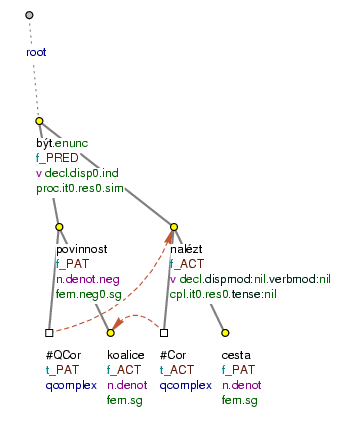
Je povinností koalice nalézt cestu. (=lit. Is duty (of) coalition to_find way)
Figure 9.44. Verbonominal control predicates

Cílem je zkvalitňovat chovy. (=lit. Goal is to_increase_quality (of) farming)
NB! The rules above only apply to constructions with the copula use of být. In constructions, in which být is in its existential use, are analyzed according to the rules in Section 2.4.1, "The notion of control"; e.g.:
Je možnost využívat počítač. (=It is possible (lit. Is possibility) to use a computer) Fig. 9.45
Je čas odejít. (=It is time (lit. Is time) to go)
Optional control is involved also in the constructions být + modal or evaluating noun (e.g.: nutnost (=necessity), nevhodnost (=unsuitability)), the Actor of which can be expressed by an infinitival construction. Cf.:
-
nutnost přijít.
ACTvčas (=lit. necessity to_come in_time).
These are mostly deadjectival nouns.
The controlled modification of the infinitive dependent on být as its Actor is controlled by the Beneficiary modifying the non-verbal part of the verbonominal predicate. The Beneficiary can also be non-expressed on the surface (see Section 2.4.1.1, "Controller").
Cf.:
-
Je nutností.
PAT{#Benef.BEN} {#Cor.ACT} pořídit.ACTvybavení. (=It is necessary (lit. Is necessity) to buy the equipment)The Actor of the infinitive pořídit (=buy/get) (dependent on být) is controlled by the non-expressed Beneficiary of the noun nutnost (=necessity). Cf. Fig. 9.46.
There is a quasi-control relation between the Actor of the verbonominal predicate (the infinitive) and the Actor of the noun in the non-verbal part of the predicate. For more on quasi-control, see Section 2.5, "Quasi-control".
Also in the constructions být + evaluating noun (e.g.: hračka (=piece_of_cake)) that cannot be modified by an infinitive, there is optional control involved. Cf.:
-
*hračka zařídit vybavení (=lit. piece_of_cake to_get equipment)
The controlled modification of the infinitive dependent on být as its Actor is controlled by the Beneficiary modifying the non-verbal part of the verbonominal predicate. The Beneficiary can also be non-expressed on the surface (see Section 2.4.1.1, "Controller").
Cf.:
-
{
#Cor.ACT} Transformovat.ACTbezpečnostní složky je hračkou.PATjen pro kouzelné dědečky.BEN(=To transform the security service is a piece of cake only for magicians)The Actor of the infinitive transformovat (dependent on být) is controlled by the Beneficiary modifying the non-verbal part of the predicate, i.e. the noun hračka (=piece_of_cake). Cf. Fig. 9.47.
Modal and evaluating adjectives (adverbs) are e.g.: nutný (=necessary), možný (=possible), potřebný (=needed), nezbytný (=necessary); obtížný (=difficult), dobrý (=good), výhodný (=advantageous/convenient), vhodný (=suitable), příjemný (=pleasant), bezohledný (=inconsiderate), lehkomyslný (=thoughtless), kolegiální (=cooperative/loyal), ošklivý (=ugly), nefér (=unfair).
In constructions být + modal or evaluating adjective (adverb), the controlled modification of the infinitive dependent on být as its Actor is controlled either by the Origo or Beneficiary of the adjective (adverb). The Beneficiary and Origo can also be non-expressed. The Origo is the controller in those cases in which it is part of the valency frame of the adjective (adverb); otherwise, it is the Beneficiary (see Section 2.4.1.1, "Controller").
Cf.:
-
Je pro finskou kapelu.
BENtěžké.PAT{#Cor.ACT} prorazit.ACT? (=Is it hard for a Finnish band to be successful?)The Actor of the infinitive prorazit (=be successful) (dependent on být) is controlled by the Beneficiary (pro finskou kapelu) of the adjective těžký (=hard). Cf. Fig. 9.48.
-
Je {
#Benef.BEN} nutné {#Cor.ACT} přejít.ACT(=It is necessary to cross the street)The Actor of the infinitive přejít (=cross) (dependent on být) is controlled by the non-expressed Beneficiary of the adjective nutný (=necessary). Cf. Fig. 9.49.
-
Je od něj.
ORIGopravdu nefér.PAT{#Cor.ACT} nedodržet.ACTslib. (=It is really unfair of him not to keep the promise)The Actor of the infinitive nedodržet (=not keep) (dependent on být) is controlled by the Origo (od něj) of the adverb nefér (=unfair). Cf. Fig. 9.50.
Examples of constructions with a non-expressed Beneficiary:
Je {#Benef.BEN} možné {#Cor.ACT} udělat to. (=It is possible to do it)
Je {#Benef.BEN} nutné {#Cor.ACT} udělat to. (=It is necessary to do it)
Je {#Benef.BEN} potřebné {#Cor.ACT} udělat to. (=It is necessary to do it)
Je {#Benef.BEN} nezbytné {#Cor.ACT} udělat to. (=It is necessary to do it)
Examples of constructions where the Beneficiary is expressed:
Pro každého nového člena či pretendenta o členství v EU je vždy obtížné se s touto slučitelností {#Cor.ACT} vypořádat. (=For every new member of the EU, it is hard to deal with this)
Myslím si, že pro ženu je lepší třikrát denně {#Cor.ACT} použít rtěnku. (=I think that for a woman, it is better to use a lipstick three times a day)
Je jistě těžké pro televizní profesionály {#Cor.ACT} odepřít si realizaci toho či onoho projektu, když právě oni v denní praxi vidí, co všechno by se ještě dalo pěkného veřejnosti nabídnout. (=It is definitely hard for the TV professionals to deny themselves...)
Argument, že i pro školy by bylo výhodnější {#Cor.ACT} platit spíše jednu učitelku pro třicet žáků než dvě pro dvaatřicet, u některých ředitelů nezabírá. (=The argument that also for the schools it would be better to pay one teacher for thirty pupils than...)
{#Cor.ACT} Hněvat se na to, že vývoz surovin pokračuje, není pro nás výhodné. (=To be angry is not convenient for us)
NB! In these constructions, control relations are represented only if it is really clear that they are present. Hence, no control is found in:
-
Není jasné, zda bude pro český tenis výhodnější smlouvu vypovědět či nikoli. (=It is not clear whether it is more convenient for the Czech tennis to terminate the contract)
It is clear from the context that the contract is not going to be terminated by český tenis (=the Czech tennis); the given construction can be rephrased as: Není jasné, zda bude pro český tenis výhodnější, když někdo smlouvu vypoví či nikoli (=It is not clear whether it is more convenient for the Czech tennis if someone terminates the contract). There is no control in the construction.
Adjectives and nouns of "individual experience" are e.g.: trapný (=embarrassing), nepříjemný (=unpleasant), potěšení (=pleasure), radost (=joy).
In constructions být + adjective or noun of "individual experience", the controlled modification of the infinitive (dependent on být as its Actor) is controlled by the Beneficiary of the adjective or noun. The Beneficiary is usually a noun in the dative but the prepositional phrase pro+4 is also a possible form. The Beneficiary can also be non-expressed on the surface (see Section 2.4.1.1, "Controller").
Cf.:
-
Je mu.
BENhloupé.PAT{#Cor.ACT} neodpovědět.ACTna dopis. (=He finds it stupid (lit. Is to_him stupid) not to answer the letter)The Actor of the infinitive odpovědět (=answer) (dependent on být) is controlled by the Beneficiary (mu) of the adjective hloupý (=stupid).
-
Je mi/pro mě.
BENpotěšením.PAT{#Cor.ACT} zúčastnit se.ACTtéto akce. (=It's a pleasure for me to take part in this event)The Actor of the infinitive zúčastnit se (=take part) (dependent on být) is controlled by the Beneficiary (mi/pro mě) of the noun potěšení (=pleasure).
More examples:
Je mu.BEN trapné.PAT {#Cor.ACT} odejít.ACT (=He finds it embarassing (lit. Is to _him embarrassing) to leave) Fig. 9.51
Je {#Benef.BEN} trapné.PAT {#Cor.ACT} přijít.ACT pozdě. (=He finds it embarassing (lit. Is to _him embarrassing) to be late) Fig. 9.52
Je mu.BEN nepříjemné.PAT {#Cor.ACT} stát.ACT dlouho ve frontě. (=He finds it unpleasant (lit. Is to _him unpleasant) to wait in a queue for a long time)
Predicative adverbs are: třeba (=necessary.adv), potřeba (=necessary.adv), škoda (=pity), hanba (=shame), trapno (=embarrassing.adv), nutno (=necessary.adv), možno (=possible.adv), zatěžko (=hard.adv), stydno (=shameful.adv).
In constructions být + predicative adverb, the adverb is assigned the CPHR functor and the verb být has a special valency frame (see Section 2.1.3, "Copula "být" (verbonominal predicate)"). The controlled modification of the infinitive (dependent on být as its Actor) is controlled by the Addressee or Beneficiary. The Addressee is the controller in those cases when it is part of the valency frame of být (usually expressed at the surface level - a noun in dative); in other cases, the controller is the Beneficiary modifying the predicative adverb (see Section 2.4.1.1, "Controller").
Cf.:
-
Je mi.
ADDRhanba.CPHR{#Cor.ACT} přijít.ACTpozdě. (=lit. Is to_me shame to_come late)The Actor of the infinitive přijít (=come) (dependent on být) is controlled by the Addressee (mu) of the verb být.
-
Je mu.
BENzatěžko.CPHR{#Cor.ACT} přijít.ACTvčas. (=lit. Is to_him hard to_come in_time)The Actor of the infinitive přijít (dependent on být) is controlled by the Beneficiary (mu) modifying the adverb. Cf. Fig. 9.54.
-
Studium už není {
#Benef.BEN} možno.CPHR{#Cor.ACT} odkládat.ACT(=It is not possible to put off the study any more)The Actor of the infinitive odkládat (=put off) (dependent on být) is controlled by the non-expressed Beneficiary of the adverb. Cf. Fig. 9.53.
More examples with the Addressee as the controller:
Je mi.ADDR stydno.CPHR {#Cor.ACT} nepřijít.ACT (=I find it shameful (lit. Is to_me shameful) not to come)
Je mu.ADDR trapno.CPHR {#Cor.ACT} neudělat.ACT to. (=He finds it embarrassing (lit. Is to_him embarrassing) not to do it)
Je mi.ADDR líto.CPHR {#Cor.ACT} odejít.ACT (=lit. Is to_me sorry to_leave)
More examples with the Beneficiary as the controller:
Je {#Benef.BEN} možno.CPHR {#Cor.ACT} udělat to. (=It's possible to do it)
Je {#Benef.BEN} nutno.CPHR {#Cor.ACT} udělat to. (=It's necessary to do it)
Je {#Benef.BEN} zapotřebí.CPHR {#Cor.ACT} udělat to. (=It's necessary to do it)
Je {#Benef.BEN} škoda.CPHR se {#Cor.ACT} ochudit o tolik vzácných látek. (=It is a pity to be losing so many valuable substances)
Control is present also in two more constructions, which are similar to each other:
-
the construction in which the infinitive depends on lze.
In this construction, the controlled modification of the infinitive is controlled by the Beneficiary of the predicate lze. Cf..:
-
{
#Benef.BEN} Lze tam {#Cor.ACT} přijít.ACTkdykoli. (=It's possible to come there any time)The Actor of the infinitive přijít (=come) (dependent on lze) is controlled by the Beneficiary of lze (is_possible). Cf. Fig. 9.55.
-
-
in the construction of the type "Je vidět Sněžku" (=apprx. It is possible/we can see Sněžka.ACC).
In this construction, the controlled modification of the infinitive is controlled by the Beneficiary modifying the verb být. Cf.:
-
{
#Benef.BEN} Je {#Cor.ACT} vidět.ACTSněžku. (=It is possible to see Sněžka; lit. Is to_see S.)The Actor of the infinitive vidět (=see) (dependent on být) is controlled by the non-expressed Beneficiary of být. Cf. Fig. 9.56.
-
Both constructions are described in more detail in Section 2.2.4, "The construction "Je vidět Sněžku/Sněžka"".
Constructions of the type "Je vidět Sněžka" (=lit. Is to_see Sněžka.NOM) (see also Section 2.2.4, "The construction "Je vidět Sněžku/Sněžka"") involve no control.
Figure 9.55. Control with the predicate "lze"

Lze tam přijít kdykoli. (=lit. Is_possible to_come anytime)
Figure 9.56. Control with constructions of the type "Je vidět Sněžku"
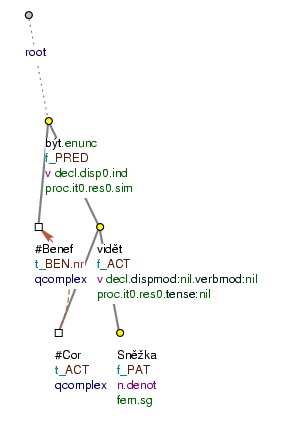
Je vidět Sněžku. (=lit. Is_possible to_see Sněžka.ACC)
!!! As for the constructions with lze, control is represented properly in the data; on the other hand, with the type "Je vidět Sněžku", control relations are not represented consistently.
Type 2 is derived from type 1: the verbal control predicate is nominalized. Two basic subtypes can be found:
-
an infinitive depends on a noun derived from a control verb (see Section 2.4.5.1, "Infinitive dependent on a noun derived from a control verb"),
-
an infinitive depends on an adjective derived from a control verb (see Section 2.4.5.2, "Infinitive dependent on an adjective derived from a control verb"),
!!! Control with type 2 is represented consistently only with the subtype described in Section 2.4.5.1, "Infinitive dependent on a noun derived from a control verb".
Also modifications of infinitives dependent on certain nouns are controlled. These are nouns derived from control verbs, especially nouns that are often part of complex control predicates (e.g.: rozhodnutí (=decision), slib (=promise), možnost (=possibility), schopnost (=ability), nutnost (=necessity), povinnost (=duty), šance (=chance), právo (=right); also řešení (=solution); způsob (=way); cesta (=way); see also the note on the nouns of "intention" Section 2.4.2, "Types of control verbs").
The controlled modification of the infinitive is controlled by a valency modification of the noun. The infinitive depending on the noun is usually its Patient or Actor. The controller can have various functors, just as with type 1. The controller does not have to be expressed at the surface level; then, a new node with the appropriate t-lemma substitute is inserted into the tectogrammatical tree.
The following three situations are the most common:
-
the Actor is the controller.
Cf.:
-
jeho.
ACTodhodlání {#Cor.ACT} přijít.PATvčas (=his determination to come in time)The Actor of the infinitive přijít (=come) (dependent on odhodlání) is controlled by the Actor of the noun odhodlání (=determination), by the pronoun jeho. Cf. Fig. 9.57.
More examples:
povinnost studentů.
ACT{#Cor.ACT} odevzdat práci do pátku (=the students' duty to submit the essay by Friday) Fig. 9.58povinnost družstva.
ACT{#Cor.ACT} uzavřít smlouvu s nájemníky (=the obligation of the housing association to sign a contract with the tenants){
#Gen.ACT} rozhodnutí {#Cor.ACT} podat žádost (=decision to submit an application){
#Gen.ACT} možnost {#Cor.ACT} studovat (=possibility to study)ředitelův.
ACTplán {#Cor.ACT} vyklidit knihovnu (=the director's plan to clear out the library)Tato právní úprava je jediným možným {
#Gen.ACT} řešením, jak {#Cor.ACT} oddělit restituce. (=...the only solution how to separate the restitutions)Hledáme {
#PersPron.ACT} způsob, jak {#Cor.ACT} zajistit bezpečnost. (=We are looking for a way to guarantee security)Známe nejlacinější {
#Gen.ACT} cestu, jak {#Cor.ACT} zkvalitnit výrobky. (=We know the cheapest way to improve the quality of the products) -
-
the Addressee is the controller.
Cf.:
-
Platí tam přísný zákaz {
#Gen.ADDR} {#Cor.ACT} konzumovat alkoholické nápoje. (=lit. ...strict ban to_consume alcoholic beverages)The Actor of the infinitive konzumovat (=consume) (dependent on zákaz) is controlled by the non-expressed Addressee of zákaz (=ban). Cf. Fig. 9.59.
-
-
the Beneficiary is the controller.
The Beneficiary is the controller especially in those cases in which the infinitive is the Actor of the noun. Cf.:
-
{
#Benef.BEN} Nutnost {#Cor.ACT} přijít.ACTvčas nás přiměla rychle dokončit rozdělanou práci. (=The necessity to come in time made us finish the work quickly)The Actor of the infinitive přijít (=come) (which is the Actor of nutnost) is controlled by the non-expressed Beneficiary of the noun nutnost (=necessity). Cf. Fig. 9.60.
Another example:
{
#Benef.BEN} nutnost {#Cor.ACT} získat peníze (=the necessity to get some money) -
Figure 9.58. Control nouns
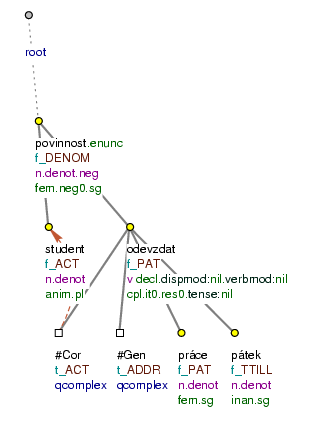
povinnost studentů odevzdat práci do pátku (=lit. duty (of) students to_submit work by Friday)
Figure 9.59. Control nouns
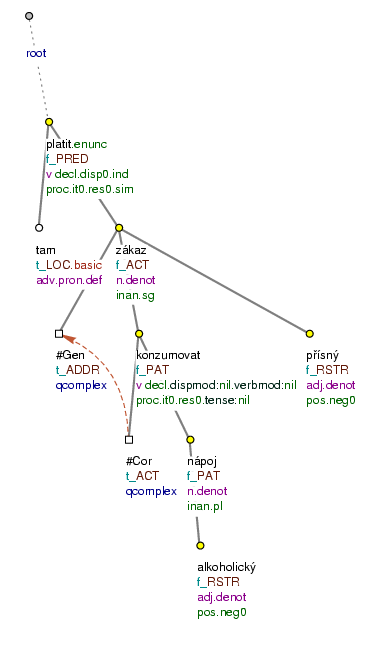
Platí tam přísný zákaz konzumovat alkoholické nápoje. (=lit. Holds there strict ban to_consume alcoholic beverages)
Figure 9.60. Control nouns
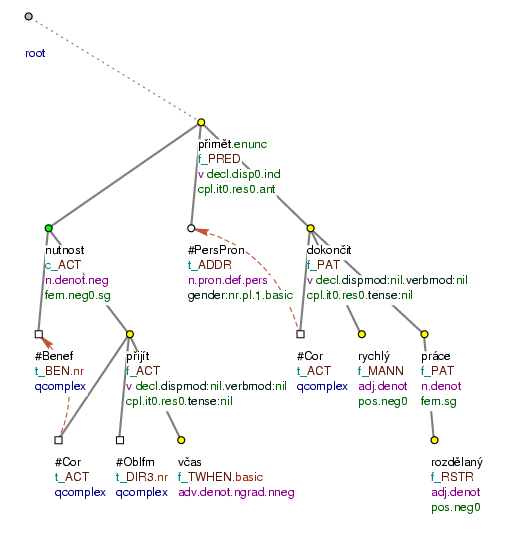
Nutnost přijít včas nás přiměla rychle dokončit rozdělanou práci. (=lit. Necessity to_come in_time us made quickly finish unfinished work)
!!! There was a subsequent check on the representation of type 2 constructions with nouns derived from control verbs (i.e. noun + infinitive) and a list of control nouns was created (see Section 3, "Control nouns"). As for the nouns in this list, it can be guaranteed that control is marked in the tectogrammatical trees as well. As for other control noun, which are not listed, control is not marked consistently in the trees.
Also modifications of infinitives dependent on certain adjectives are controlled. These are adjectives derived from control verbs, especially adjectives that are often part of verbonominal control predicates (e.g.:rozhodnutý (=decided), slibující (=promising), usilující (=striving), umožňující (=enabling), schopný (=able), odhodlaný (=determined), nutný (=necessary), povinný (=compulsory)).
The controller does not depend on the adjective. If the adjective modifies a noun the noun is the controller, then. Cf.:
-
člověk odhodlaný {
#Cor.ACT} podat.PATtrestní oznámení (=a person determined to lodge a complaint)The Actor of the infinitive podat (=lodge) (which is the Patient of odhodlaný) is controlled by the noun governing the adjective odhodlaný (=determined), i.e. by the noun člověk (=person).
In case the control adjective modifies a full verb (e.g.: uznat (=admit), shledat (=find), považovat (=consider)), the controller is one of the modifications of the verb, usually a noun in the accusative (the Patient). Cf.:
-
Uznali koryto řeky za schopné {
#Cor.ACT} pojmout.PATvětší množství vody. (=They found the riverbed able to hold a bigger amount of water)The Actor of the infinitive pojmout (=hold) (dependent on schopný) is controlled by the Patient of uznat (=acknowledge), i.e. the noun koryto (=riverbed).
More examples:
student usilující {#Cor.ACT} dokončit fakultu (=a student trying to finish the study) Fig. 9.61
osoba povinná {#Cor.ACT} vydávat majetek (=the person obliged to hand over the property) Fig. 9.62
Shledali ho schopným {#Cor.ACT} vyřešit situaci. (=They found him able to solve the situation) Fig. 9.63
Figure 9.61. Control adjectives
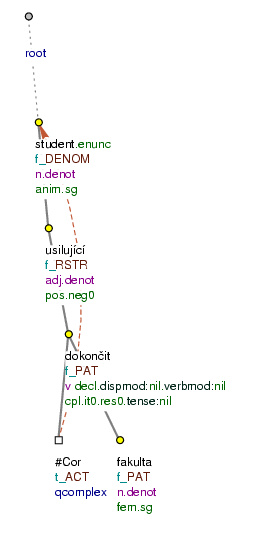
student usilující dokončit fakultu (=lit. student trying to_finish faculty)
Figure 9.62. Control adjectives
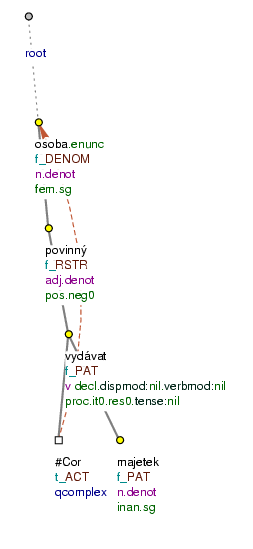
osoba povinná vydávat majetek. (=lit. person obliged to_issue property)
Figure 9.63. Control adjectives
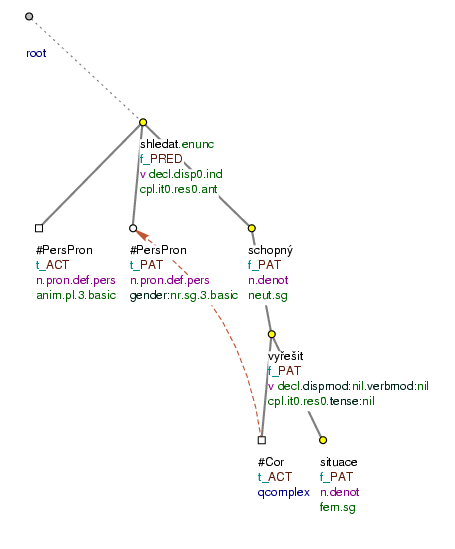
Shledali ho schopným vyřešit situaci. (=lit. (They) found him able to_solve situation)
!!! Control with control adjectives is not represented consistently in the data; often, it is not represented at all.
Type 3 is derived from type 1: the infinitive a modification of which is controlled is nominalized in these constructions. This type also includes cases in which the verb cannot be modified by an infinitive. Such a verb is modified by a deverbal noun, a modification of which (usually the Actor) is controlled by a valency modification (usually the Patient) of the verb. There are two basic subtypes of type 3:
-
a noun depends on a control verb and the noun can be replaced by an infinitive (see Section 2.4.6.1, "A nominalized infinitive depends on a verbal control predicate"),
-
a noun depends on a control verb and the noun cannot be replaced by an infinitive (see Section 2.4.6.2, "Control verbs that cannot be modified by an infinitive"),
!!! Control with type 3 is represented consistently only with the subtype described in Section 2.4.6.1.1, "A nominalized infinitive dependent on a complex control predicate". In all the other cases, it is not represented consistently and often it is not represented at all.
The position of the infinitive (a modification of which is controlled) can also be occupied by a noun derived from it. Then, one of the noun's modifications is controlled - the one corresponding to the controlled modification of the infinitive. The controller is a modification of the control verb. Cf.:
-
Rodiče zakázali synovi {
#Cor.ACT} práci ve výškách. (=The parents have forbidden their son to work high above the ground)The Actor of the noun práce is controlled by the Addressee of zakázat, the noun synovi. Cf. Fig. 9.64.
The infinitive can be nominalized with all types of control verbs: one-word control verbs as well as complex and verbonominal control predicates. With verbs that can have two infinitival modifications (the subjects of which are controlled), both the infinitives can be nominalized.
For more on nominalized infinitives with complex control predicates, see Section 2.4.6.1.1, "A nominalized infinitive dependent on a complex control predicate".
Examples:
{#PersPron.ACT} Měl zájem o {#Cor.ACT} studium na vysoké škole. (=He was interested in studying at a university) Fig. 9.65
{#Cor.ACT} Složení makléřských zkoušek je povinné pro všechny obchodníky. (=Passing the exam is obligatory for all businessmen) Fig. 9.66
{#Cor.ACT} Získání amerického občanství vyžaduje od zájemců schopnost {#Cor.ACT} mluvit anglicky. (=One has to speak English in order to get the American citizenship; lit. Getting American citizenship requires from applicants ability to_speak English) Fig. 9.67
{#PersPron.ACT} Odmítla {#Cor.ACT} obvinění. (=She refused the accusation)
{#PersPron.ACT} Přišel na {#Cor.ACT} pomoc. (=He came to help; lit. for help)
Protivník je ochoten k {#Cor.ACT} uzavření smíru. (=The rival is willing to make peace; lit. for making peace)
Pavel je připraven k {#Cor.ACT} provedení zákroku. (=Pavel is ready for the operation; lit. performing operation)
{#Cor.ACT} Využití této právní úpravy je jediným možným {#Gen.ACT} řešením. (=The only solution is to make use of the law; lit. Making use of...)
Figure 9.64. One-word control predicates
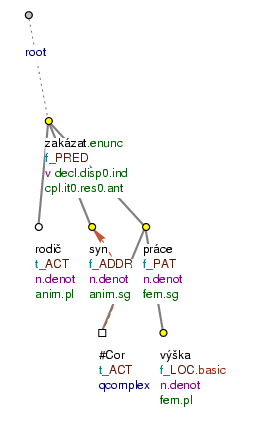
Rodiče zakázali synovi práci ve výškách. (=lit. Parents have_forbidden son work in heights)
Figure 9.65. Complex control predicates
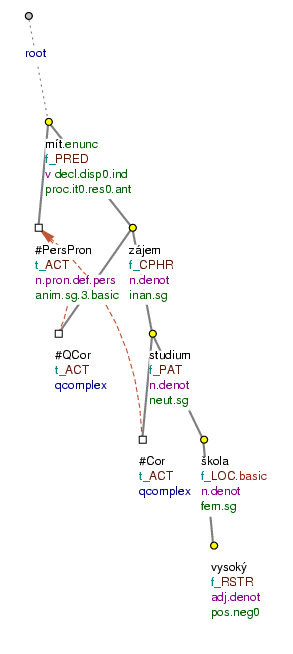
Měl zájem o studium na vysoké škole. (=lit. (He) had interest in study at high school)
Figure 9.66. Verbonominal control predicates
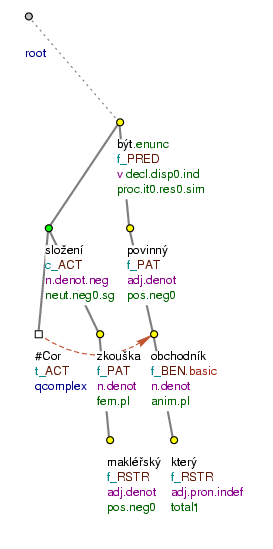
Složení makléřských zkoušek je povinné pro všechny obchodníky. (=lit. Passing broker exams is obligatory for all businessmen)
Figure 9.67. One-word control predicate with double control
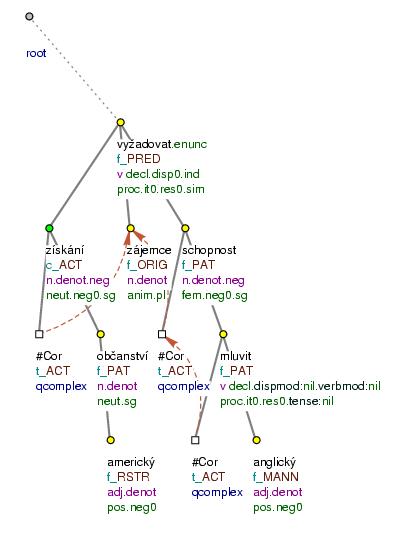
Získání amerického občanství vyžaduje od zájemců schopnost mluvit anglicky. (=lit. Getting American citizenship requires from applicants ability to_speak English)
No control is involved in constructions like: Má daleko k postupu. (=lit. Has far from promotion; meaning: He is not going to be promoted anytime soon); Má blíž k vyhazovu. (=lit. Has closer to being_fired)
As was already suggested in Section 2.4.3, "Types of control constructions and the issue of nominalizations", nouns are by definition much vaguer than verbs (the infinitive), therefore, the decision whether a given combination of a complex predicate with a noun involves control or not is accompanied by several problems. Apart from the problems described in Section 2.4.3, "Types of control constructions and the issue of nominalizations", it is possible to find the following cases - within the complex predicate + noun combinations - that are not taken as cases of control:
-
complex predicate + noun that is not a nominalized infinitive.
For example: mít zájem o knihu (=lit. have interest in book), mít právo na peníze (=lit. have right on money).
!!! Some of these cases can be interpreted as involving ellipsis of the nominalized infinitive (e.g.: mít právo na získaní peněz (=lit. have right on getting money)), but this type of ellipsis is not represented as such in the annotation at present.
-
complex predicate + noun that could be a nominalized infinitive; however, the vagueness of the construction makes it unclear whether this is really so.
For example: Máme v České republice zájem o výrobu drceného kamene (=lit. ...(we) have interest in production of crushed stone).
This problem is closely related to the fact that control is associated with a particular meaning of the verb (see also Section 2.4.1, "The notion of control"). Cf.:
-
mít / projevit zájem o výrobu (=have / show interest in production)
= want to produce.
-
mít / projevit zájem o něčí výrobu kamene (=have / show interest in production)
= be interested in someone's production of stone
!!! Whereas individual meanings of one-word control predicates are distinguished in the valency lexicon; the situation is different with complex control predicates. For example, the meaning difference above is not indicated in the valency lexicon - both meanings correspond to a single meaning.
In these constructions (complex predicate + noun), the control relation is represented in the tree only if the presence of the grammatical coreference relation is obvious. For example, in the construction Máme v České republice zájem o výrobu drceného kamene. (=We are interested in crushed stone production here in the Czech republic) it is not clear which meaning we are dealing with, so the control is not represented in the tree.
-
In the constructions complex predicate + noun (just like in the complex predicate + infinitive cases; see Section 2.4.4.1, "Infinitive dependent on the nominal part of a complex control predicate"); the controller is a valency modification of the verbal part of the complex predicate (not the nominal one). For rules on representing coreference relations in this type of construction and for more on quasi-control, see also Section 9.3.4.2, "Sharing of valency modifications between the verbal and nominal components (quasi-control)".
The noun dependent on a complex control predicate can be (just like with the constructions verbal control predicate + infinitive) derived either from an active or passive infinitive. If it is derived from a passive infinitive, the controller is usually not the Actor but rather the Patient or Addressee. Cf.:
-
Slavia má značnou šanci na {
#Cor.ACT} postup. (=Slavia has a good chance to get through (=lit. for promotion)= an active infinitive is nominalized.
The Actor of the noun postup (=promotion) (dependent on the nominal part of mít šanci (=have a chance)) is controlled by the Actor of the verbal part of the control predicate (i.e. the noun Slavia), which is identical in reference with the non-expressed Actor of the noun šance (=chance). Cf. Fig. 9.68.
-
Novela nemá naději na {
#Cor.PAT} přijetí. (=The amendment has no chance to pass (lit. for acceptence))= a passive infinitive is nominalized.
The Patient of the noun přijetí (=acceptance) (dependent on the nominal part of mít naději (=have a chance)) is controlled by the Actor of the verbal part of the predicate (i.e. the noun novela (=amendment)), which is identical in reference with the non-expressed Actor of naděje (=chance). Cf. Fig. 9.69.
-
Všichni akcionáři mají nárok na {
#Cor.ADDR} vyplacení dividendy. (=All shareholders have a right to get the dividends (lit. for paying dividends))= a passive infinitive is nominalized.
The Addressee of the noun vyplacení (=paiying) (dependent on the nominal part of the predicate mít nárok (=have a right)) is controlled by the Actor of the verbal part of the predicate (i.e. the noun akcionáři (=shareholders)), which is identical in reference with the non-expressed Actor of the noun nárok (=right). Cf. Fig. 9.70.
More examples of active infinitives being nominalized:
Koalice učinila pokus o {#Cor.PAT} zavedení majetkové daně. (=The Coalition made an attempt to introduce the property tax)
Klient má možnost neomezeného {#Cor.PAT} výběru. (=The client has the possibility of unlimited choice)
Cukrovar má potíže se {#Cor.PAT} získáním úvěru. (=The sugar refinery has difficulties getting a loan)
More examples of passive infinitives being nominalized:
Návrh ODS má malou naději na {#Cor.PAT} realizaci. (=The ODS proposal has little chance to be realized (lit. for realization))
Tito lidé mají nárok na {#Cor.PAT} odškodnění. (=These people have the right to be compensated (=lit. for compensation)
Figure 9.68. Complex control predicates
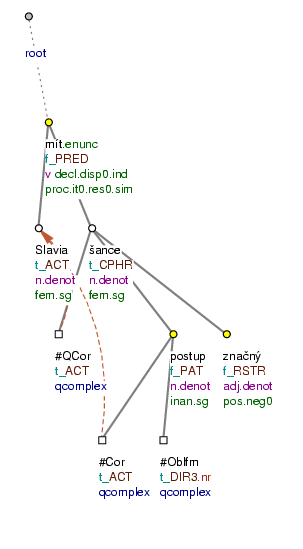
Slavia má značnou šanci na postup. (=lit. Slavia has considerable chance for promotion)
Figure 9.69. Complex control predicates
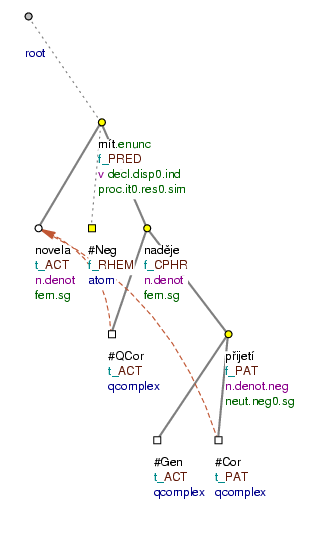
Novela nemá naději na přijetí. (=lit. Amendment not_has chance for passing)
Figure 9.70. Complex control predicates
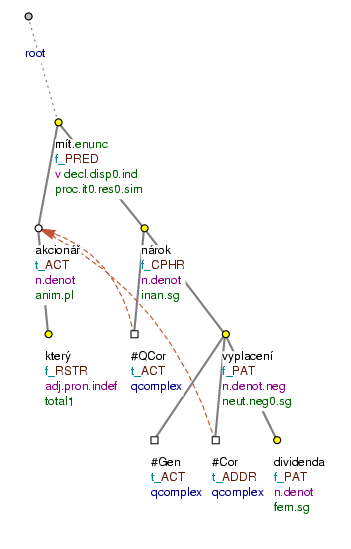
Všichni akcionáři mají nárok na vyplacení dividendy. (=lit. All shareholders have right for paying dividends)
!!! There was a subsequent check on the representation of type 3 constructions with complex predicates (i.e. complex predicate + noun) and a list of complex control predicates was created (see Table E.1, "Control type 3 of complex predicates"). As for the complex predicates in this list, it can be guaranteed that control is marked in the tectogrammatical trees as well. As for other complex control predicates, which are not listed, control is not marked consistently in the trees.
Some control verbs cannot be modified by an infinitive. They are modified by deverbal nouns, a modification of which is controlled by a valency modification (usually the Actor) of the verb. These are verbs like: podezírat (=suspect), stíhat (=prosecute), obvinit (=accuse), očekávat (=expect), pochválit (=praise), omluvit se (=apologize), pracovat na něčem (=work on sth). Some of these verbs combine with deverbal nouns with the CAUS or DIR1 functors (or other adjunct functors) Cf.:
-
Policie ho stíhá pro {
#Cor.ACT} falšování dokladů. (=The police are prosecuting him for falsifying documents)The Actor of the noun falšování (=falsifying) is controlled by the Patient of the verb stíhat (=prosecute), by the pronoun ho (him). Cf. Fig. 9.71.
More examples:
Očekávali ode mě {#Cor.ACT} účast na schůzce. (=They expected my presence at the meeting; lit. from me presence) Fig. 9.72
Obvinili ho z {#Cor.ACT} vyvolání roztržky. (=They accused him of causing the incident)
Podezírají ho z {#Cor.ACT} útěku před odpovědností. (=They suspect him from running away from his duties)
{#PersPron.ACT} Omluvil se z {#Cor.ACT} účasti na šampionátu. (=lit. (He) apologized from presence at (the) championship)
{#PersPron.ACT} Omluvil se za pozdní {#Cor.ACT} příchod. (=He apologized for being late)
{#PersPron.ACT} Pracuje na {#Cor.ACT} dokončení disertační práce. (=He is working on finishing his dissertation)
Figure 9.71. Control verbs

Policie ho stíhá pro falšování dokladů. (=lit. Police him is_prosecuting for falsifying documents)
Figure 9.72. Control verbs
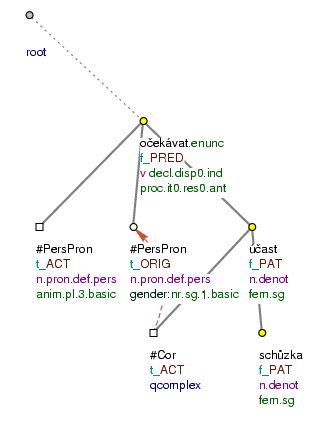
Očekávali ode mě účast na schůzce. (=lit. (They) expected from me presence at meeting)
!!! With control verbs that cannot be modified by an infinitive, the type 3 control is not represented consistently in the data or it is not represented at all.
Type 4 is also derived from type 1, but also certain features of types 2 and 3 can be recognized here: like with type 2, the verbal control predicate is nominalized and, like with type 3, the infinitive a modification of which is controlled is nominalized, too. This type also includes the cases of nominalized verbs that cannot be modified by an infinitive but which are modified by deverbal nouns (one modification of which is controlled). There are the following subtypes of type 4 constructions:
-
a noun derived from an infinitive depends on a noun derived from a control verb (see Section 2.4.7.1, "A noun derived from an infinitive dependent on a noun derived from a control verb"),
-
a noun derived from an infinitive depends on an adjective derived from a control verb (see Section 2.4.7.1, "A noun derived from an infinitive dependent on a noun derived from a control verb"),
-
a noun depends on a noun derived from a control verb and the dependent noun cannot be replaced by an infinitive (see Section 2.4.7.3, "A noun dependent on a noun derived from a control verb that cannot be modified by an infinitive"),
-
a noun depends on an adjective derived from a control verb and the dependent noun cannot be replaced by an infinitive (see Section 2.4.7.4, "A noun dependent on an adjective derived from a control verb that cannot be modified by an infinitive").
!!! Control with type 4 is not represented consistently in the data; often, it is not represented at all.
Control is involved also in cases in which a deverbal noun (in place of an infinitive) depends on a control noun.
A valency modification of the dependent noun (usually the one corresponding to the subject) is controlled by one of the valency modifications of the control noun. The controller can have various functors, just as with type 1. The controller does not have to be expressed at the surface level; then, a new node with the appropriate t-lemma substitute is inserted into the tectogrammatical tree. Cf.:
-
Petrovo úsilí o {
#Cor.ACT} zajištění Pavlovy přítomnosti na semináři. (=Petr's effort to secure (lit. (of) securing) Pavel's presence in the class)= Petr tries to secure Pavel's presence in the class.
The Actor of the noun zajištění (=securing) is controlled by the Actor of the noun úsilí (=effort), by the possessive adjective Petrovo. Cf. Fig. 9.73.
The control noun can be derived from a one-word control predicate as well as from a complex or verbonominal control predicate.
Examples:
{#Gen.ADDR} umožnění {#Cor.ACT} vyřizování dokladů na počkání (=lit. enabling (of) issuing documents while_you_wait) Fig. 9.74
jeho šance na {#Cor.ACT} získání zakázek (=lit. his chances for getting orders) Fig. 9.75
{#Benef.ACT} Nutnost {#Cor.ACT} ucházení se o zaměstnání je přiměla k rychlému jednání. (=lit. necessity (of) applying for job them made to quick acting) Fig. 9.76
jeho ochota k {#Cor.ACT} užití kompetencí (=lit. his willingness to using competences) Fig. 9.77
jeho pokus o podvodné {#Cor.ACT} vylákání majetku (=his attempt at deceitful cheating_out (of) property)
{#Gen.ACT} snahy o {#Cor.ACT} spojování stran (=lit. tendencies for joining parties)
jeho schopnost {#Cor.ACT} získávání finančních prostředků (=lit. his ability (of) getting financial resources)
{#Gen.ACT} možnost {#Cor.ACT} provozování vodních sportů (=lit. possibility (of) doing water sports)
ministrovo právo {#Cor.ACT} kladení / na kladení požadavků (=lit. minister's right for having requirements)
Petrův zájem o {#Cor.ACT} setkání (=lit. Petr's interest in meeting)
Figure 9.73. Control nouns

Petrovo úsilí o zajištění Pavlovy přítomnosti na semináři. (=lit. Petr's effort in securing Pavel's presence in class)
Figure 9.74. Control nouns
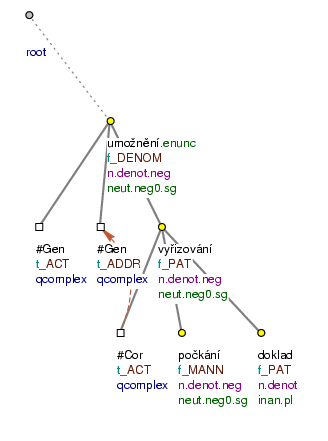
umožnění vyřizování dokladů na počkání (=lit. enabling (of) issuing documents while waiting)
Control is involved also in cases in which a deverbal noun (in place of an infinitive) depends on a control adjective.
The controller does not depend on the adjective. The controllee (usually the subject) - if the control adjective modifies a noun - is controlled by the noun. Cf.:
-
student usilující o {
#Cor.ACT} dokončení fakulty (=a student trying to finish the faculty)The Actor of the noun dokončení (=finishing) is controlled by the noun modified by the adjective usilující (=trying), i.e. by the noun student. Cf. Fig. 9.78.
In those cases when the control adjective modifies a full verb (e.g.: uznat (=admit), shledat (=find), považovat (=consider)), the controller is one of the modifications of the verb, usually a noun in the accusative (the Patient). Cf.:
-
Shledali ho ochotným k {
#Cor.ACT} navázání kontaktu. (=They found him willing to make contact (lit. making contact))The Actor of the noun navázání (=forming) is controlled by the Patient of the verb shledat (=find), by the pronoun ho (=him). Cf. Fig. 9.80.
The control adjective can be derived from a one-word control predicate as well as from a complex or verbonominal control predicate.
Examples:
poslanec odhodlaný k {#Cor.ACT} odchodu ze strany (=a deputy determined to leave (lit. leaving) the party) Fig. 9.79
osoba usilující o {#Cor.ACT} zajištění pořádku (=the person trying to secure (lit. securing) order)
lidé ochotní ke {#Cor.ACT} spolupráci (=people willing to cooperate (lit. cooperation))
Figure 9.78. Control adjectives
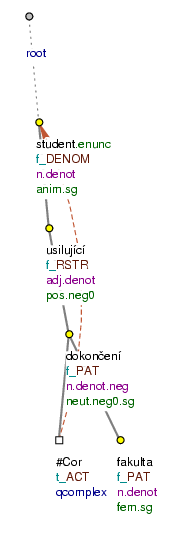
student usilující o dokončení fakulty (=lit. student trying at finishing faculty)
2.4.7.3. A noun dependent on a noun derived from a control verb that cannot be modified by an infinitive
Also those control verbs can be nominalized that cannot be modified by an infinitive but that are rather modified by deverbal nouns one modification of which (usually the Actor) is controlled by a valency modification of the nominalized control verb. These are nouns derived from verbs like: podezírat (=suspect), stíhat (=prosecute), obvinit (=accuse), očekávat (=expect), pochválit (=praise), omluvit se (=apologize), pracovat na něčem (=work on sth). Cf.:
-
Soudkyně zahájila proti zatčené stíhání {
#PersPron.PAT} za nepovolené {#Cor.ACT} ozbrojování. (=The judge initiated prosecution against the arrested woman for being armed illegaly)The Actor of the noun ozbrojování (=arming) is controlled by the non-expressed Patient of the noun stíhání (=prosecution) . Cf. Fig. 9.81.
More examples:
Čelí obvinění {#PersPron.PAT} z {#Cor.ACT} vyvolání roztržky. (=He is facing the accusation of being responsible for the incident)
pochvala {#Gen.PAT} za{#Cor.ACT} dodržování limitů (=praise for keeping the limits)
2.4.7.4. A noun dependent on an adjective derived from a control verb that cannot be modified by an infinitive
Also those control verbs can become adjectives that cannot be modified by an infinitive but that are rather modified by deverbal nouns one modification of which (usually the Actor) is controlled. These are adjectives derived from verbs like: podezírat (=suspect), stíhat (=prosecute), obvinit (=accuse), očekávat (=expect), pochválit (=praise), omluvit se (=apologize), pracovat na něčem (=work on sth).
The controller does not depend on the adjective derived from a control verb. One of the valency modifications of the deverbal noun is - in those cases when the control adjective modifies a noun - controlled by this noun. Cf.:
-
člověk podezřelý z {
#Cor.ACT} vraždy (=the person suspected from murder)The Actor of the noun vražda (=murder) is controlled by the noun modified by the adjective podezřelý (=suspect), i.e. by the noun člověk (=person). Cf. Fig. 9.82.
In case the control adjective modifies a full verb (e.g.: uznat (=admit), shledat (=find), považovat (=consider)), the controller is one of the modifications of the verb, usually a noun in the accusative (the Patient). Cf.:
-
Považovali ho za obviněného z {
#Cor.ACT} vraždy. (=They considered him accused of murder)The Actor of the noun vražda (=murder) is controlled by the Patient of považovat (=consider), the pronoun ho (=him). Cf. Fig. 9.83.
More examples:
muž obviněný z {#Cor.ACT} krádeže (=a man accused of stealing)
pracovník pochválený za {#Cor.ACT} dodržování limitů (=the worker praised for keeping the limits)
